Among the architectural treasures we source and restore, few pieces speak with as much quiet authority as our antique limestone wall fountains. Each fountain in this curated collection carries centuries of weathering, artistic intention, and craftsmanship, transforming any courtyard or garden into a historic sanctuary. These reclaimed limestone features are far more than decorative accentsthey are sculptural storytellers echoing the traditions of the South of France, Provence, and the Mediterranean basin.
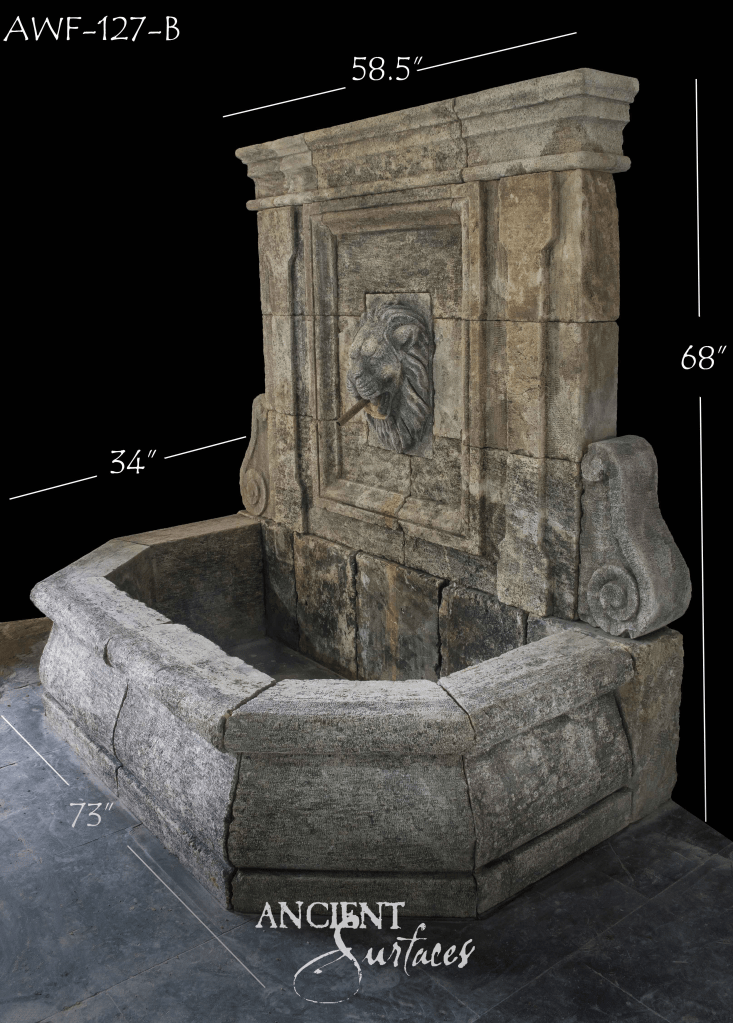
The first fountain, AWF-127-B, presents itself with an almost civic presence, reminiscent of village fountains found near medieval town squares. Its lion head spout, hand carved in aged limestone, offers both symbolic protection and a regal focal point. The basin, crafted from thick reclaimed stone slabs, shows authentic patina and soft weather marks that only centuries can create. The architectural framingdefined by pronounced cornices and structural blocksturns this fountain into a commanding anchor for an outdoor gathering area or garden retreat.
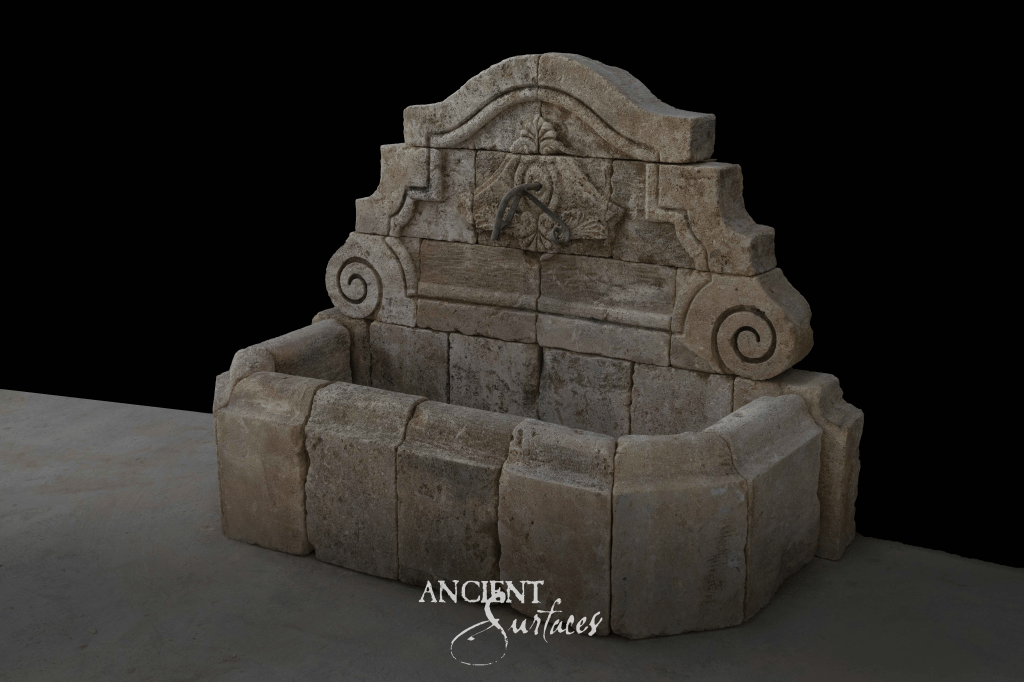
The second fountain in this group reflects a gentler personality, with scrollwork details that appear to unfurl organically from the stone itself. This reclaimed limestone basin has a more rounded, intimate silhouette, making it ideal for courtyards or patios where softness and subtlety matter. The sculpted crest and iron spout sit atop limestone blocks that carry the natural texture, tone variation, and mineral composition classic to antique French limestone. This is the kind of fountain that blends into its environment instantly, as if it had always belonged there.
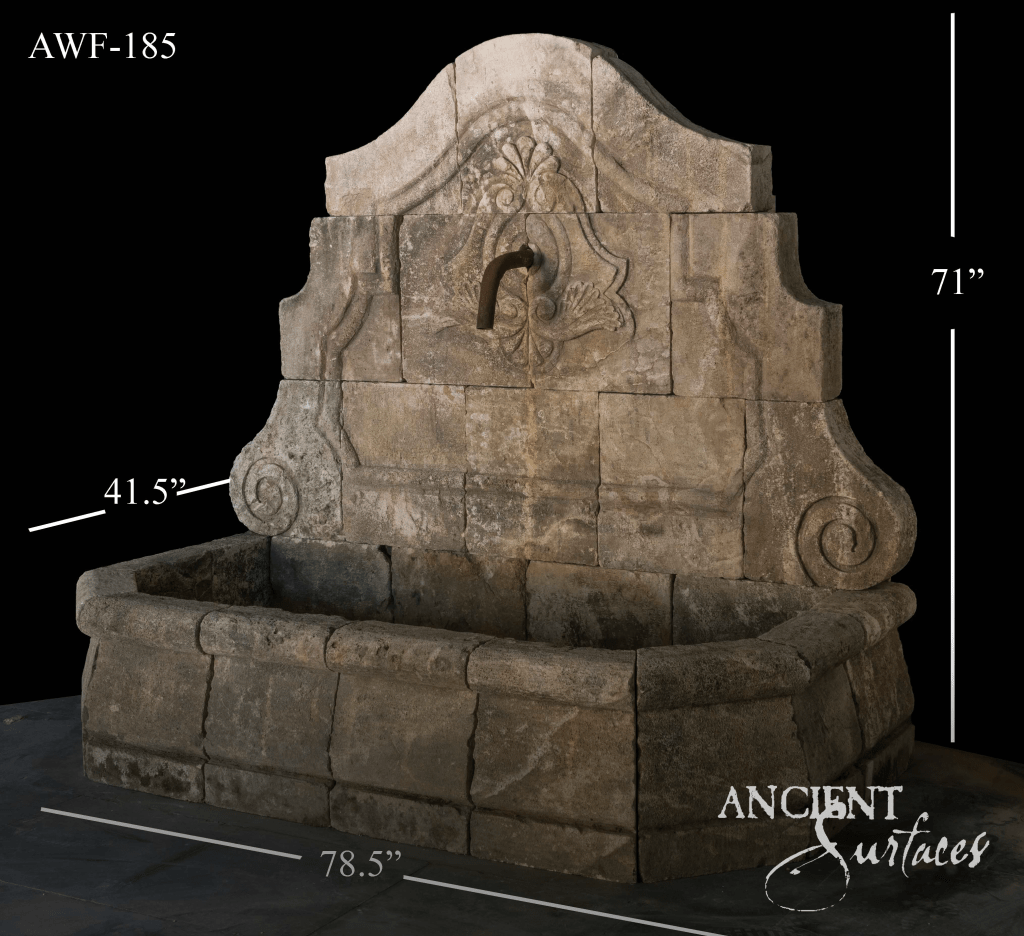
Our third piece, AWF-185, stands with a noble, architectural stature. The carved motifs centered around its panel suggest a fountain that once belonged to a larger estate or monastery. The limestone has aged to deep, earthy tones, accented by mineral veining and historical markings that validate its provenance. The curvature of the basin harmonizes with the strong vertical lines of the upper structure, creating a fountain that feels both grounded and elevated. Its presence transforms any space into an open air cloister infused with calm.
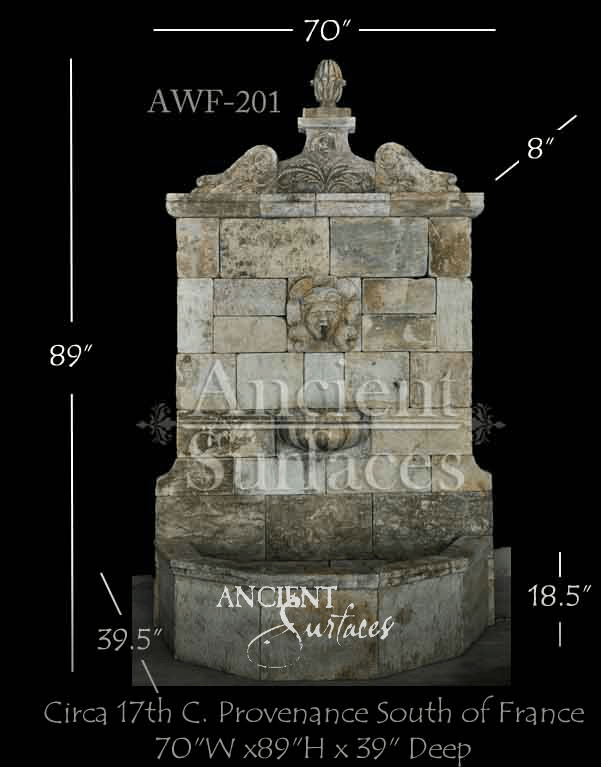
Lastly, AWF-201 embodies classical French proportions, with meticulously stacked limestone blocks forming an imposing and beautifully balanced structure. The stone exhibits a full spectrum of antique limestone colorationfrom pale wheat to soft grays to deeper umber patchesan aesthetic only achieved through centuries of natural aging. The carving at the crest is delicate yet intentional, reinforcing the fountain’s status as both a utility element and a piece of sculptural art. The dual level design, with basin and upper spout, creates a gentle cascade that enhances the sensory experience of any outdoor environment.
These reclaimed limestone wall fountains by Ancient Surfaces offer more than visual beauty. They provide atmosphere. They introduce movement, sound, shadow, and history into modern living spaces. Whether installed in a courtyard, garden, entrance façade, or pool terrace, each fountain becomes a living elementan ever changing artwork shaped by light, water, and time.
Come visit our interactive digital online catalog
Call us at: 212-461-0245 // 212-913-9588
There is a moment right before water meets stone where silence feels sacred. That quiet pause is the soul of every antique limestone wall fountain curated by Ancient Surfaces. These pieces are more than architectural accents; they are fragments of European history recast for today’s most discerning outdoor and interior spaces.
Each fountain carries the imprint of centuries: hand-chiseled textures, softened edges, patinas shaped by sun and rain, and artisan marks no modern machine could ever replicate. What you see in the images below isn’t “decor.” It’s heritage.
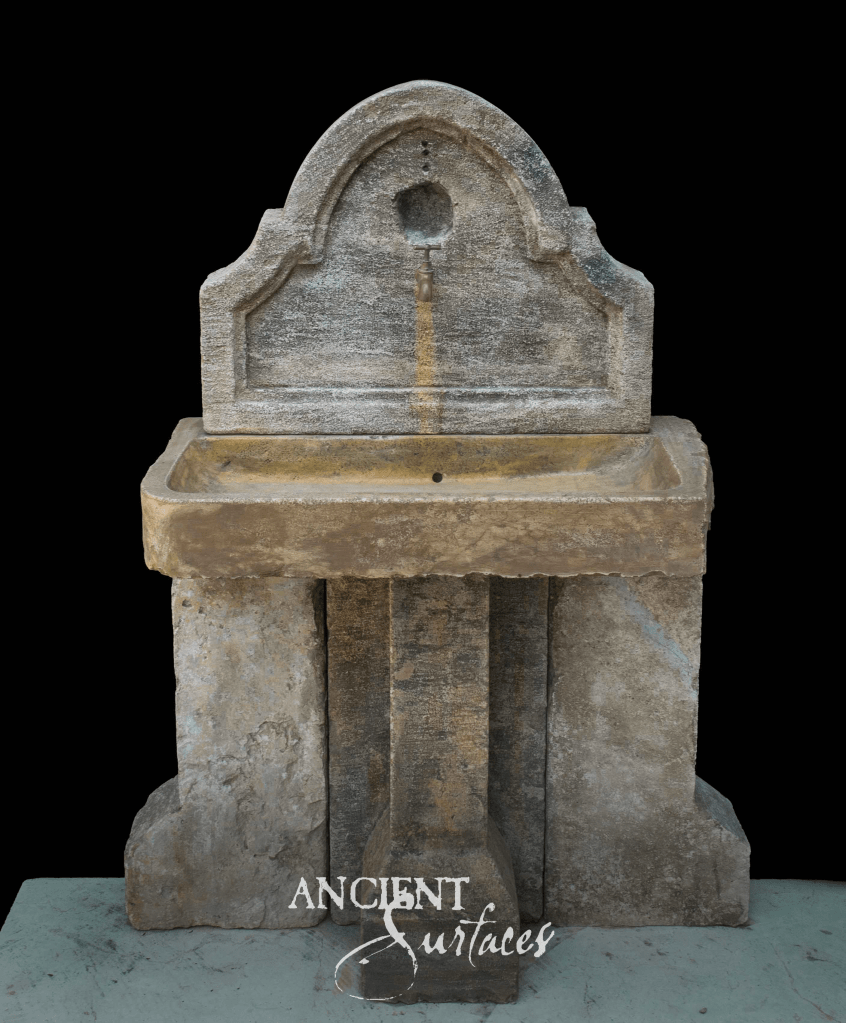
This first wall fountain reveals an unmistakable rural European charm. The gently arched pediment, framed by a subtly raised border, shares the vocabulary of old chapels and countryside farmhouses. Its surface, naturally worn and deeply textured, tells the story of stone exposed to generations of seasonal change.
The shallow basin below, carved from one solid block of reclaimed limestone, once served as a village wash point. Today, it becomes a poetic outdoor focal point: perfect for entry courtyards, shaded loggias, or a Mediterranean garden wall where water can echo softly throughout the day.
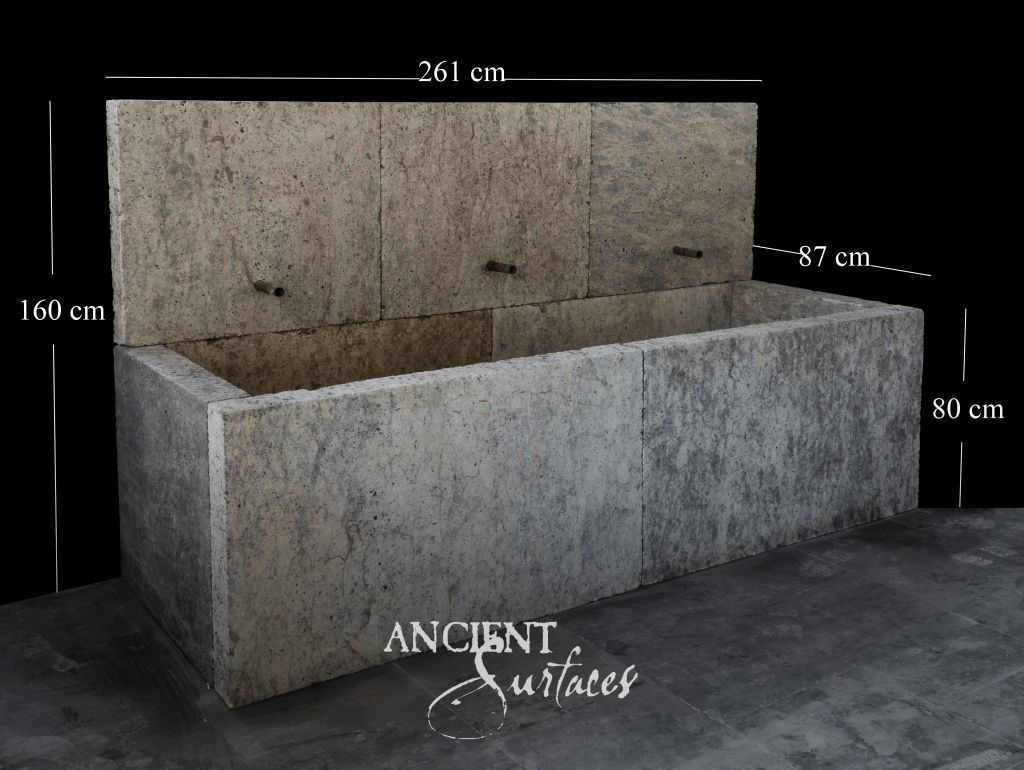
At nearly three meters wide, this antique limestone trough fountain is monumental. Its three towering back panels rise with understated authority, creating a seamless stone plane that feels ancient and architectural.
Each spout sits low and utilitarian an indication that this was once a working agricultural basin, likely used for storing water or tending livestock. Now, reinvented as a bespoke fountain, it becomes a sculptural water element ideal for large estates, vineyard homes, and modern rustic landscapes that crave authenticity.
The grey washed tones, iron oxide streaks, and natural mineral marks elevate it visually and give it the quiet gravitas that modern replicas can only imitate.

A charming nod to 18th century European garden ornamentation, this wall fountain features a beautifully carved stone dolphin emerging from a field of reclaimed limestone tiles. The stone’s buff and honey colors add warmth, while the playful relief injects personality and movement into the design.
Perfect for a romantic garden alcove, a shaded veranda wall, or alongside a pool terrace, this fountain adds narrative and antique character to any space it inhabits. It’s a conversation starter, an heirloom waiting to be rediscovered.
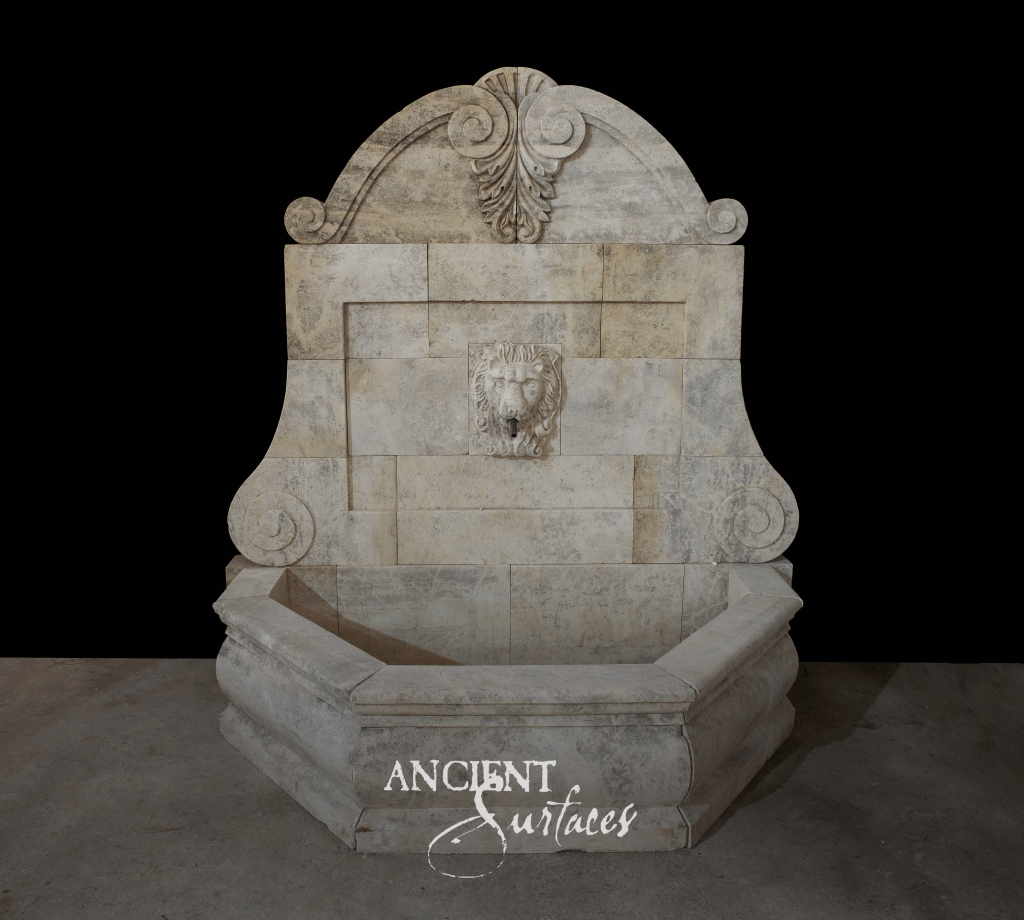
This final fountain is pure classical drama. A sculpted lion’s head anchors the wall, its timeworn snout and flowing mane carved with remarkable depth. The backdrop of reclaimed limestone blocks is meticulously arranged to highlight the fountain’s symmetry and scale. Below, the octagonal basin with its robust moldings and layered contours, recalls the façades of old courtyards in Provence and Northern Italy. This piece is for clients who want grandeur, presence, and an undeniable sense of permanence. Installed at an entryway or central garden axis, it becomes architectural poetry.
Each wall fountain featured above exists as a singular artifact; hand-carved, reclaimed, and revived with care. At Ancient Surfaces, we don’t simply sell fountains. We safeguard architecture. We curate history. And we bring these storied pieces back into the world so they can begin their next chapter in your home.
Come visit our interactive digital online catalog
Call us at: 212-461-0245 // 212-913-9588
Water has always been the soul of architecture and nowhere is that truer than in the wall fountains reclaimed, restored, and reimagined by Ancient Surfaces. Each of these limestone masterpieces transforms stillness into rhythm, turning courtyards, patios, and garden walls into places of quiet luxury. The sound of water falling against timeworn stone connects past and present proof that the simplest gestures of design can stir the deepest emotions.
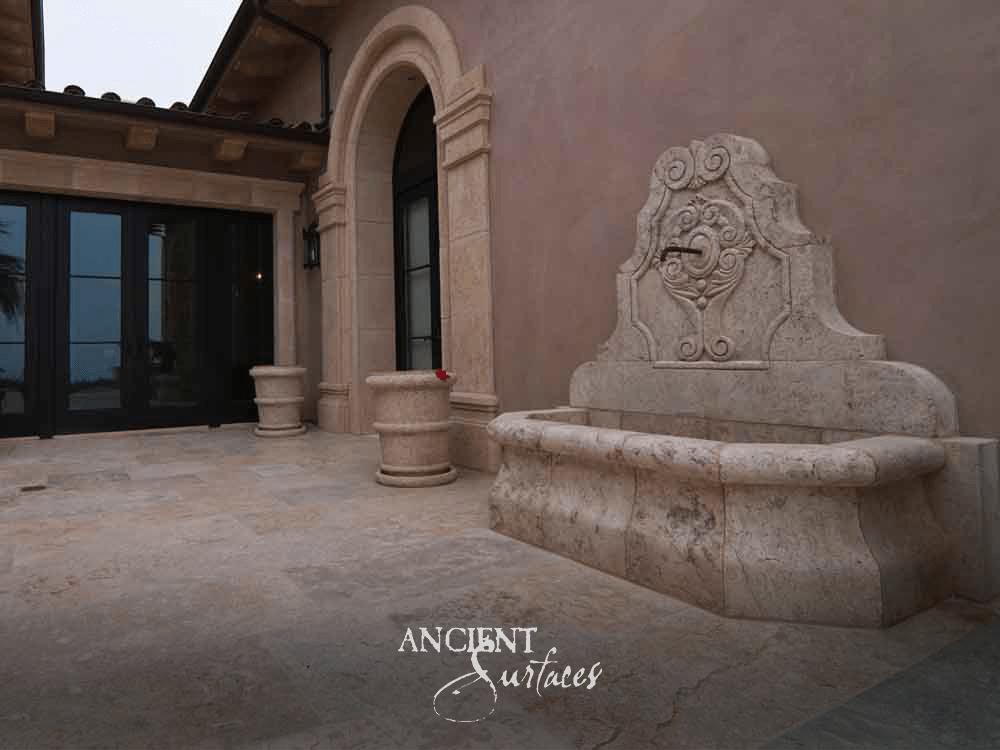
Set against the soft earth tones of a Mediterranean façade, this limestone wall fountain radiates balance and symmetry. Its sculpted scrollwork and arched crown draw the eye upward, while its broad, carved basin invites reflection below. The reclaimed limestone, naturally weathered to soft beige and taupe, mirrors the floor beneath it, unifying the courtyard as a single architectural gesture. The patina lightly freckled and smooth to the touch feels both noble and familiar, as if this fountain had always belonged to the space it graces.
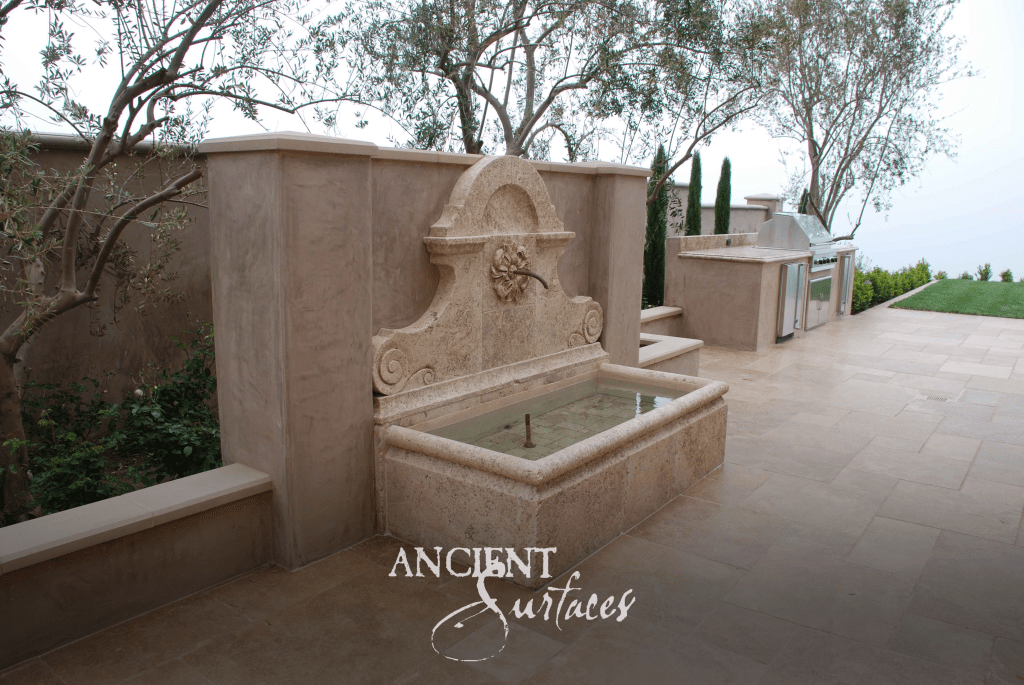
This second installation, nestled beside olive trees and a stone terrace, captures the soul of outdoor living. Its hand-carved limestone façade rises from a rectangular basin filled with shimmering water, catching the changing light of the day. The fountain’s scrolls and lion-head spout evoke Renaissance elegance, while the surrounding elements clay earth tones, greenery, and sky complete its timeless dialogue. It’s a place where formality and nature breathe together, where sound becomes serenity.
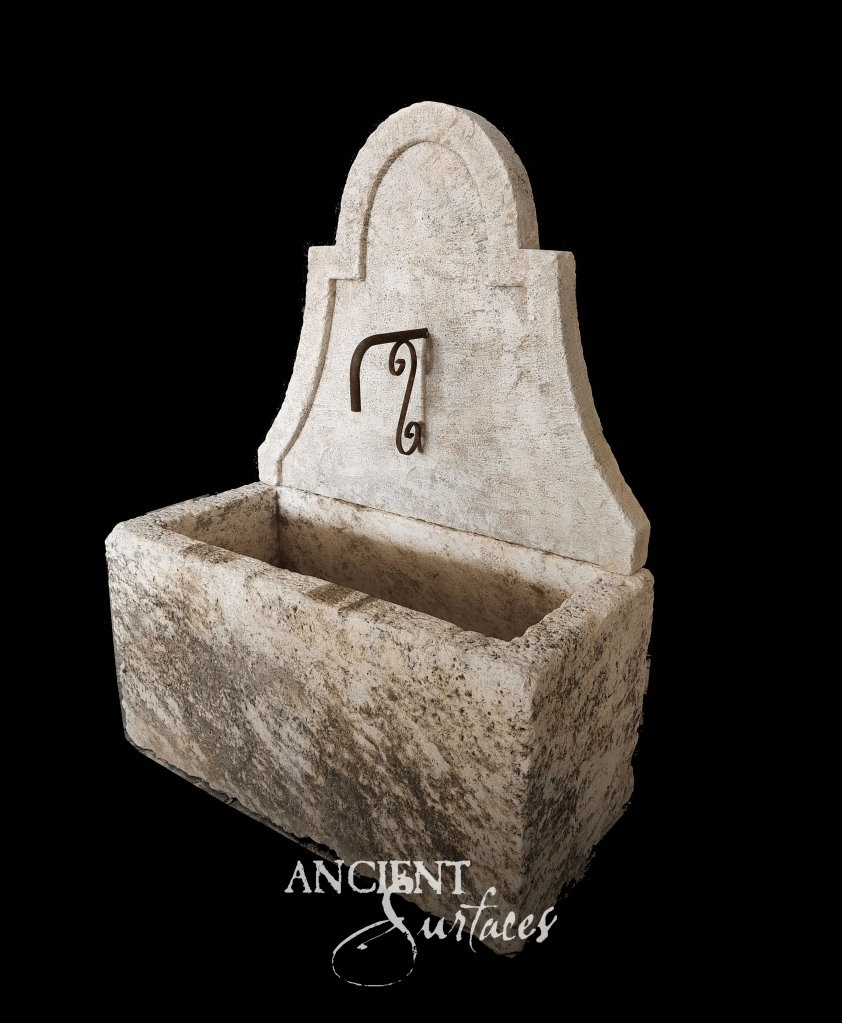
Compact yet full of presence, AWF-610 embodies the poetry of simplicity. Cut from reclaimed Burgundy limestone, its roughly textured surface tells of long-forgotten courtyards and monastic gardens. The weathered stone, flecked with moss hues, carries a natural story that polished marble never could. Its wrought-iron spout aged to a deep umber adds a touch of artisanal soul. Perfect for intimate patios or walled gardens, this fountain doesn’t shout; it murmurs.
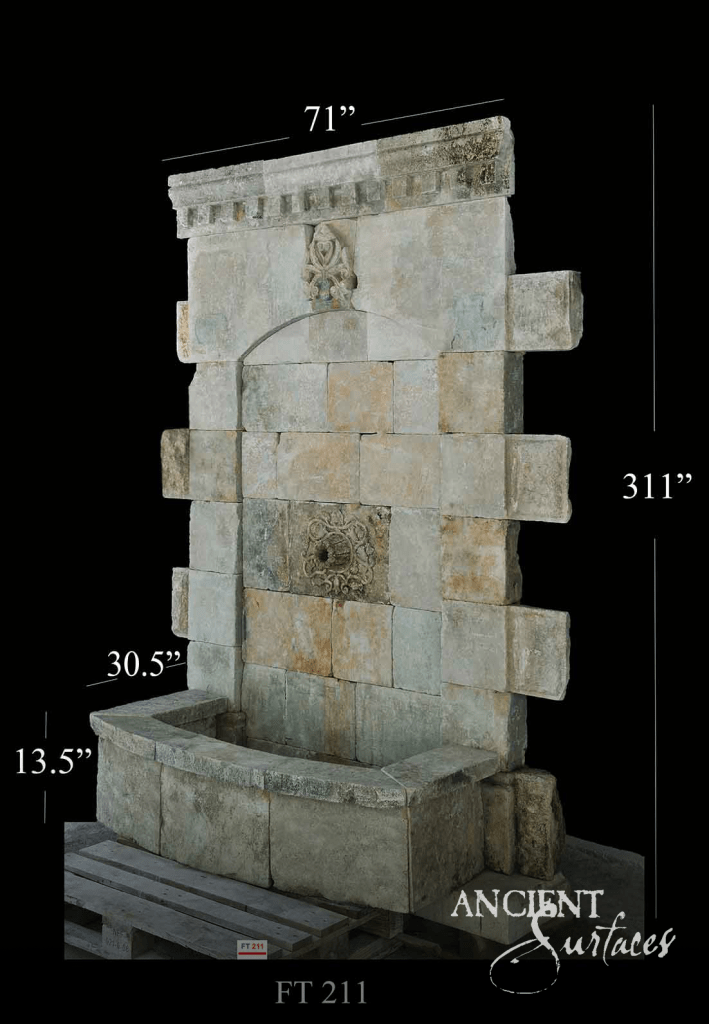
The FT 211 stands like an ancient façade reborn, a grand limestone wall assembled from blocks that once supported centuries of architecture. Its vast proportions and precise geometry reveal a mastery of proportion and detail. From its hand-carved crest to the sculptural reliefs surrounding the water outlet, every element feels deliberate and time-honored. The stone’s natural veining and layered patina evoke the passage of centuries a commanding yet contemplative centerpiece for large courtyards or formal estates.
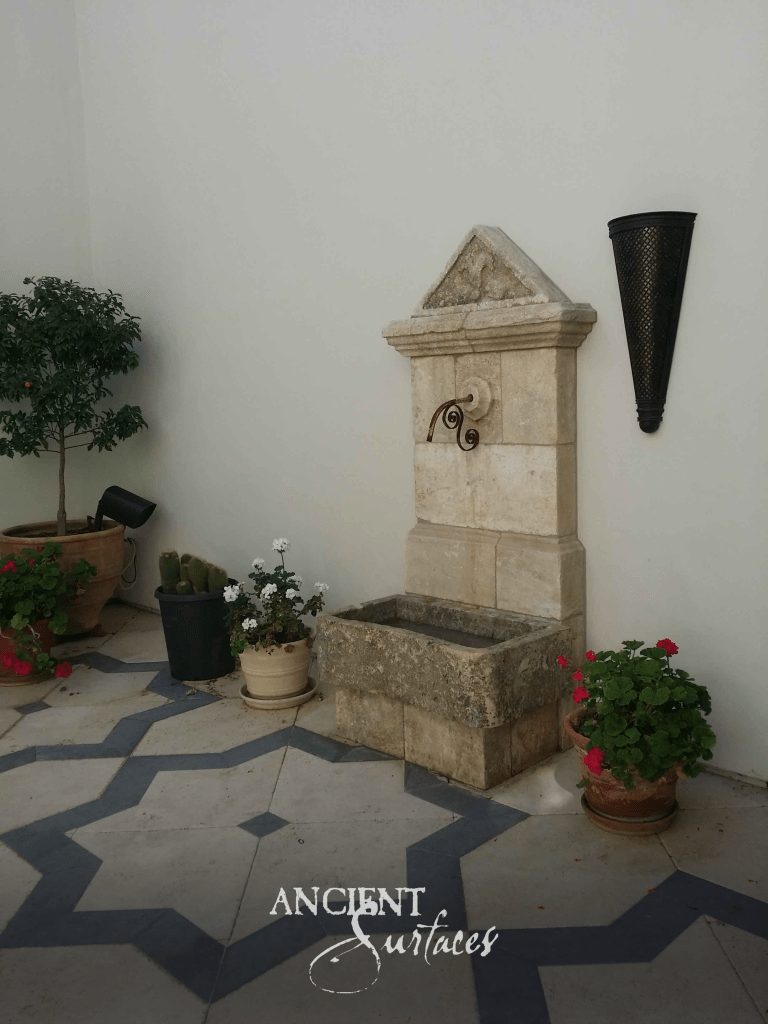
Tucked in a corner framed by flowering pots, this petite limestone fountain transforms an otherwise quiet terrace into a sanctuary. The triangular pediment, paired with the deeply aged basin, recalls classical design in miniature. Its natural stone texture part chalk, part honey harmonizes beautifully with potted greenery and sunlight. The sound it emits is gentle, a steady whisper that anchors the garden’s rhythm. It is proof that even small fountains, when reclaimed and restored by Ancient Surfaces, can command emotion beyond their scale.
No two limestone wall fountains from Ancient Surfaces are alike, each one is an encounter between history and craftsmanship. Every chisel mark, every vein of stone, and every aged spout carries the mark of time. These fountains are not designed to impress; they are designed to belong to architecture, to landscape, and to the lives that gather around them.
Come visit our interactive digital online catalog
Call us at: 212-461-0245 // 212-913-9588
Choosing between a wall fountain and a pool fountain really comes down to how you want water to behave in your space. A wall fountain is a vertical gesture that lives on or against architecture; it paints the wall with a quiet sheet of sound, uses very little floor area, and is perfect for courtyards, loggias, breezeways, entry alcoves, and garden walls where you want intimacy and a soft acoustic veil. A pool fountain is a freestanding centerpiece; it asks for open radius and repays you with 360-degree presence, a broader soundstage, and a ceremonial feel that anchors motor courts, parterres, and large terraces.
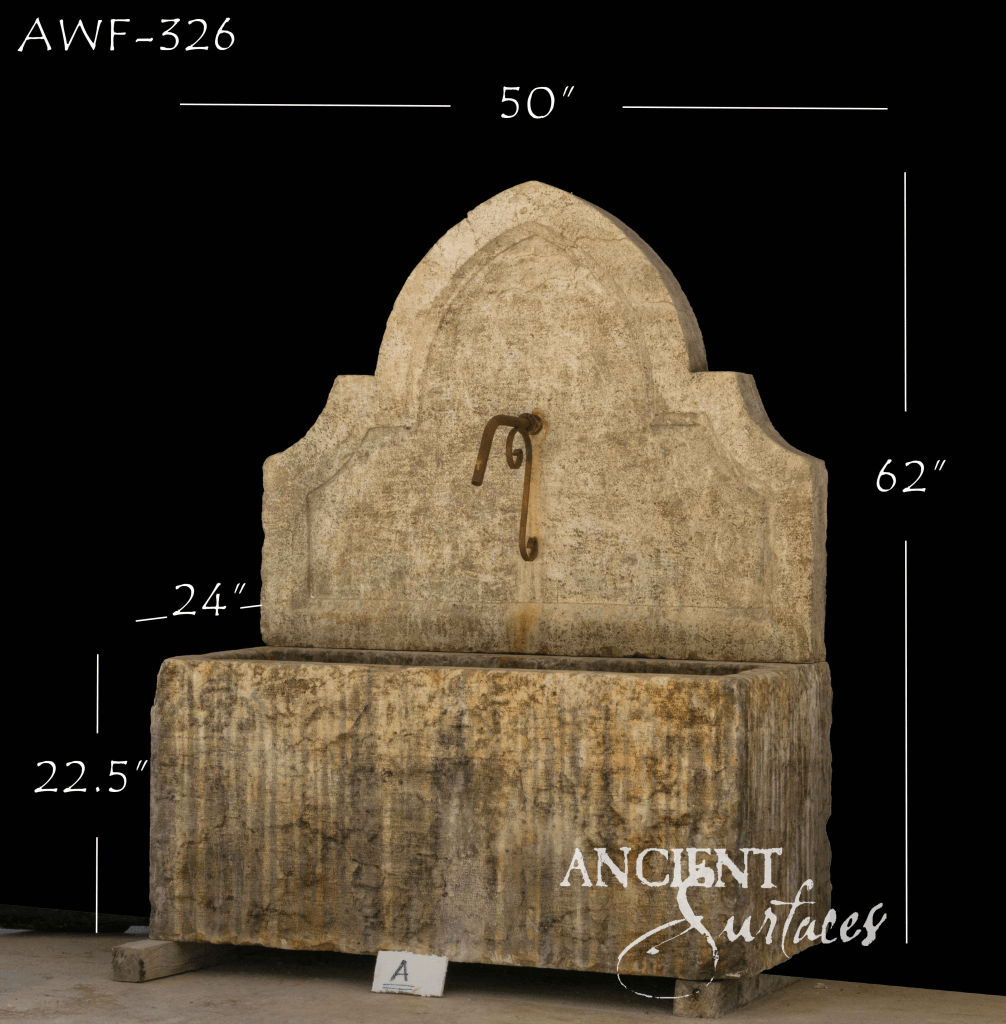
Our AWF-326 wall fountain shows why designers lean this way in tighter spaces. The Gothic-arched backplate and hand-forged spout create a calm, laminar fall into a thick limestone trough, giving you that coveted “old-world hush” right where you pass by. It’s superb at the end of a garden path or beside a doorway because it delivers presence without projecting too far into the walkway.
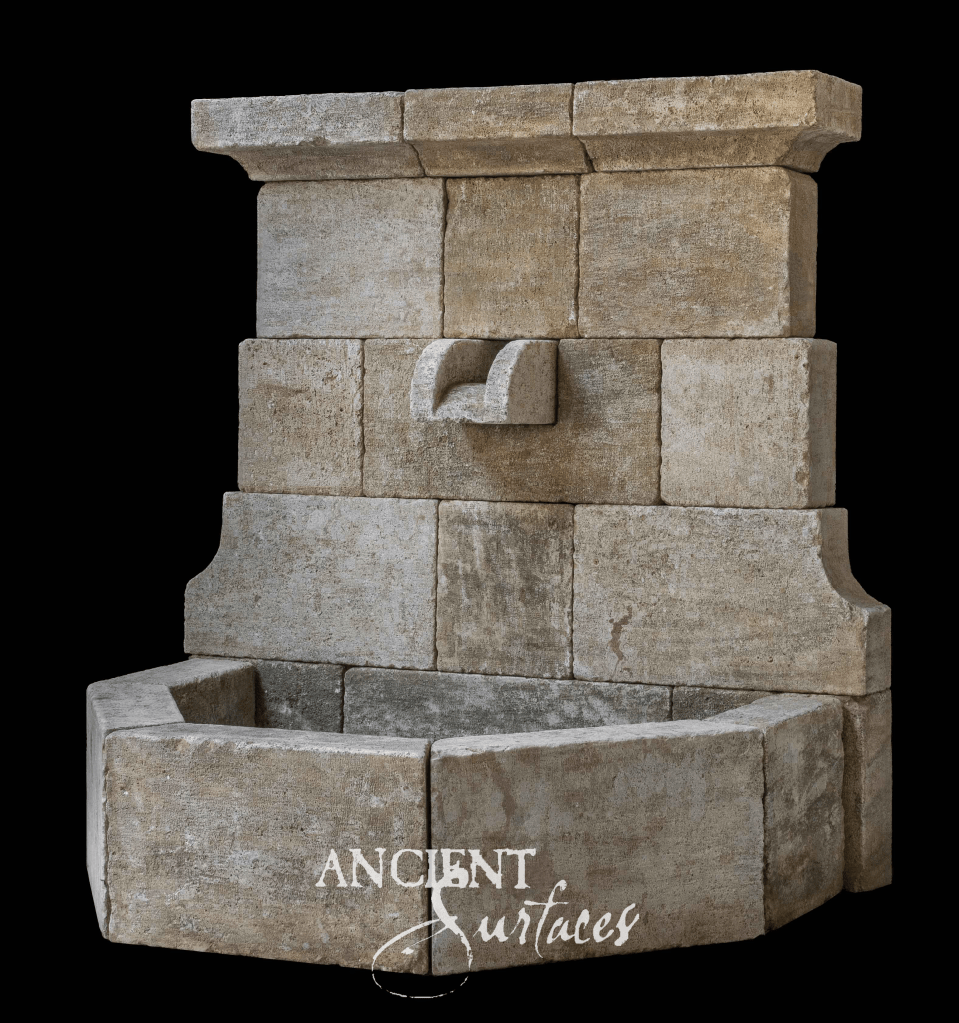
When clients want something crisp and architectural, AWF-312 steps in. Built from antique ashlar blocks with a pronounced cornice, it reads like a fragment of a centuries-old façade, yet it behaves beautifully in narrow side yards and along breezeways. The centered spout sends water straight into a faceted fore-basin, so splash is controlled and paving stays tidy. It’s the quintessential “classic European, but tailored” wall fountain.
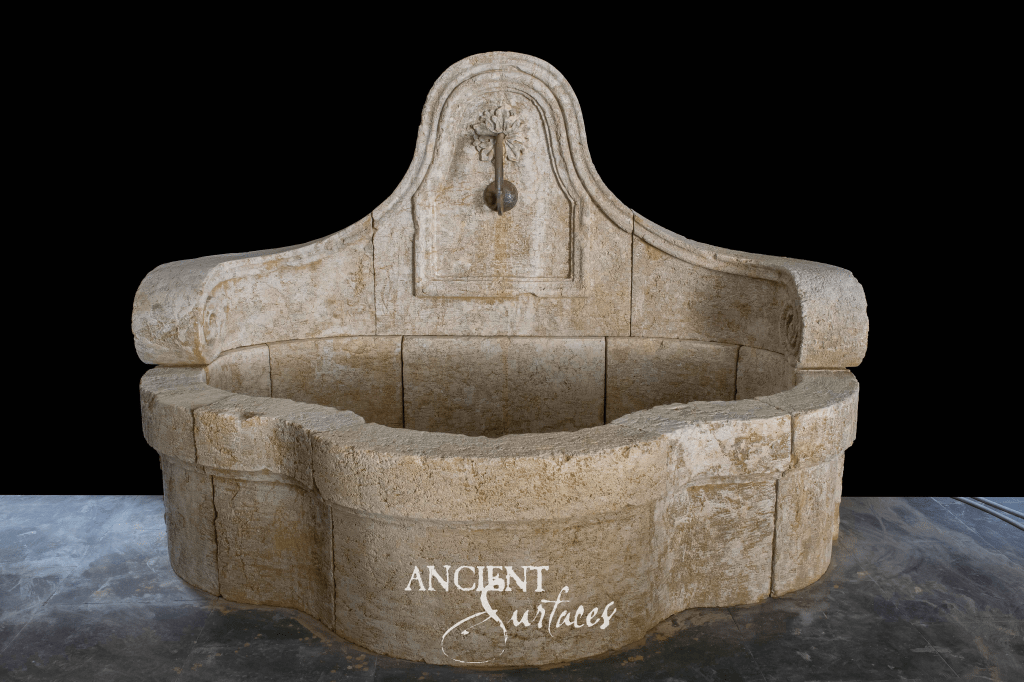
Entertaining terraces call for a little more embrace, which is where AWF-577 excels. Its sweeping shoulders and deep, scalloped basin wrap the listener in a steady, conversational murmur enough sound to soften chatter and make meals feel private, not so much that it competes with music or firelight. In Provençal, Tuscan, or Mediterranean schemes, the reclaimed limestone patina of AWF-577 looks like it has always been there.
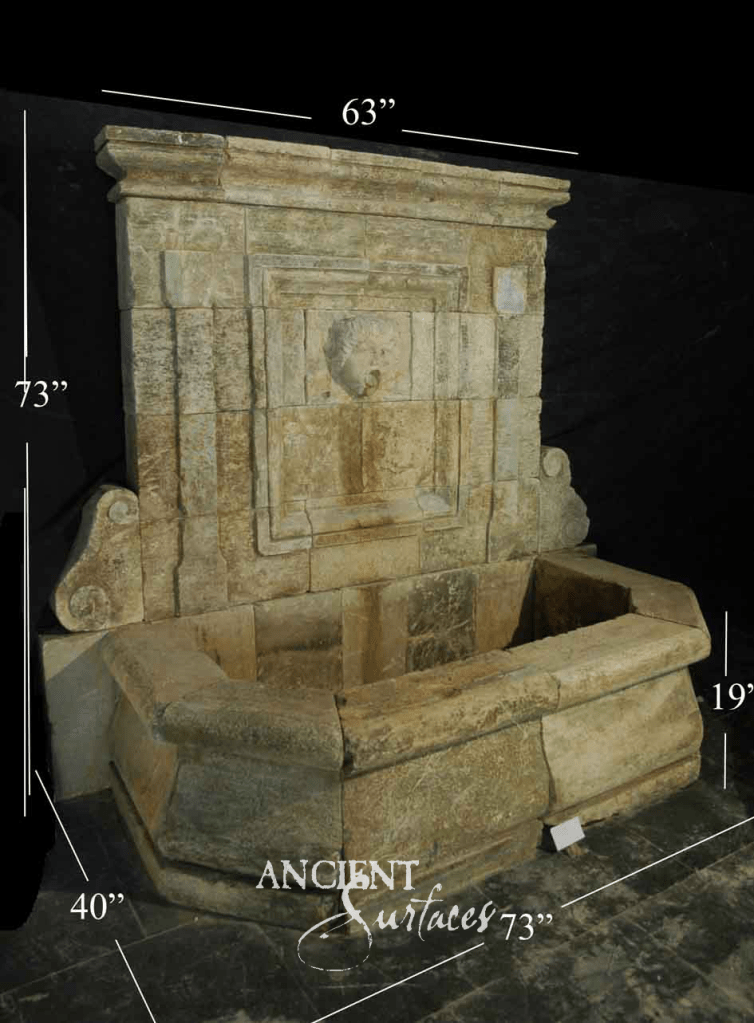
For grand architecture, this antique wall fountain becomes the statement. The paneled and pilastered back rises to nearly six feet, the coping is thick and timeworn, and the broad trough makes the waterline read like a reflective band of silver. This is the wall fountain you place on a pool house elevation, at the terminus of a long allée, or along an orangery wall where it can be admired from across a court.
Every example above is carved from reclaimed, antique limestone curated by Ancient Surfaces stone that has weathered centuries outdoors and carries authentic color, texture, and memory. That pedigree is why our antique limestone wall fountains feel native the day they’re installed, and why our freestanding pool fountains immediately command a space without shouting. If you send us a quick site photo with dimensions, we’ll help you determine whether a wall fountain or a pool fountain will serve your architecture best, then size, compose, and engineer the piece so it looks and sounds exactly right.
Come visit our interactive digital online catalog
Call us at: 212-461-0245 // 212-913-9588
Wall fountains have long been symbols of refinement, artistry, and cultural richness. At Ancient Surfaces, every reclaimed limestone fountain carries with it centuries of character, reimagined for modern-day living spaces. These are not merely water features; they are architectural statements that embody both elegance and timeless craftsmanship. Each fountain in our collection showcases a different interpretation of stonework, offering depth, detail, and sophistication.
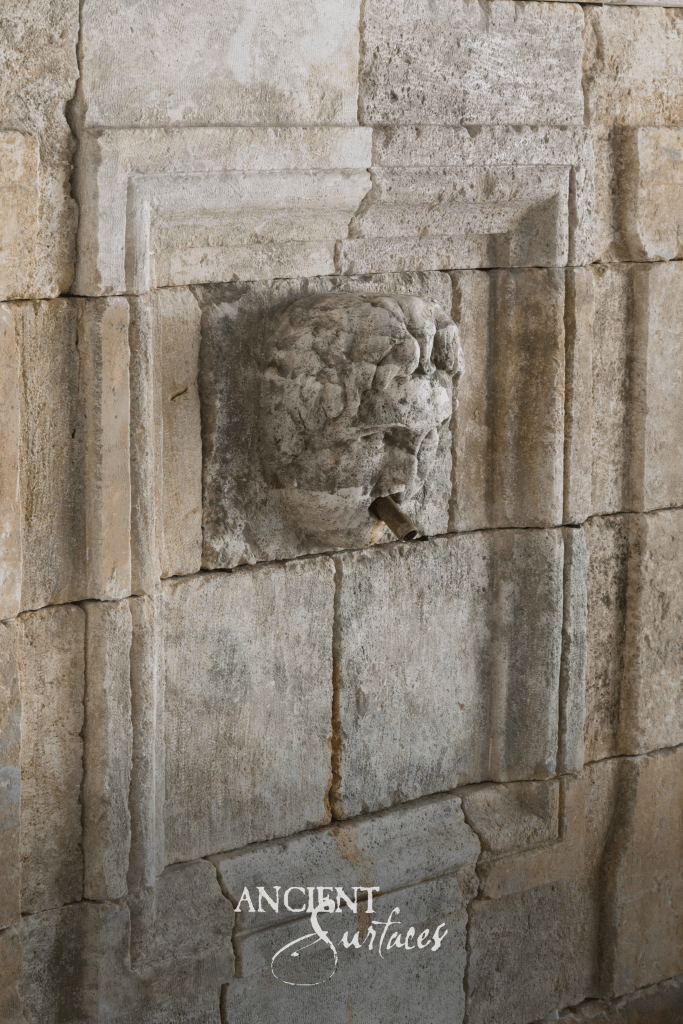
The first limestone fountain commands attention with its grand architectural frame and finely carved details. The noble lines, enhanced by the natural patina of reclaimed stone, give it a regal presence suited for both courtyards and interiors. Its sculptural angel-head spout not only serves a functional role but also symbolizes strength and protection, enhancing the fountain’s classical elegance.
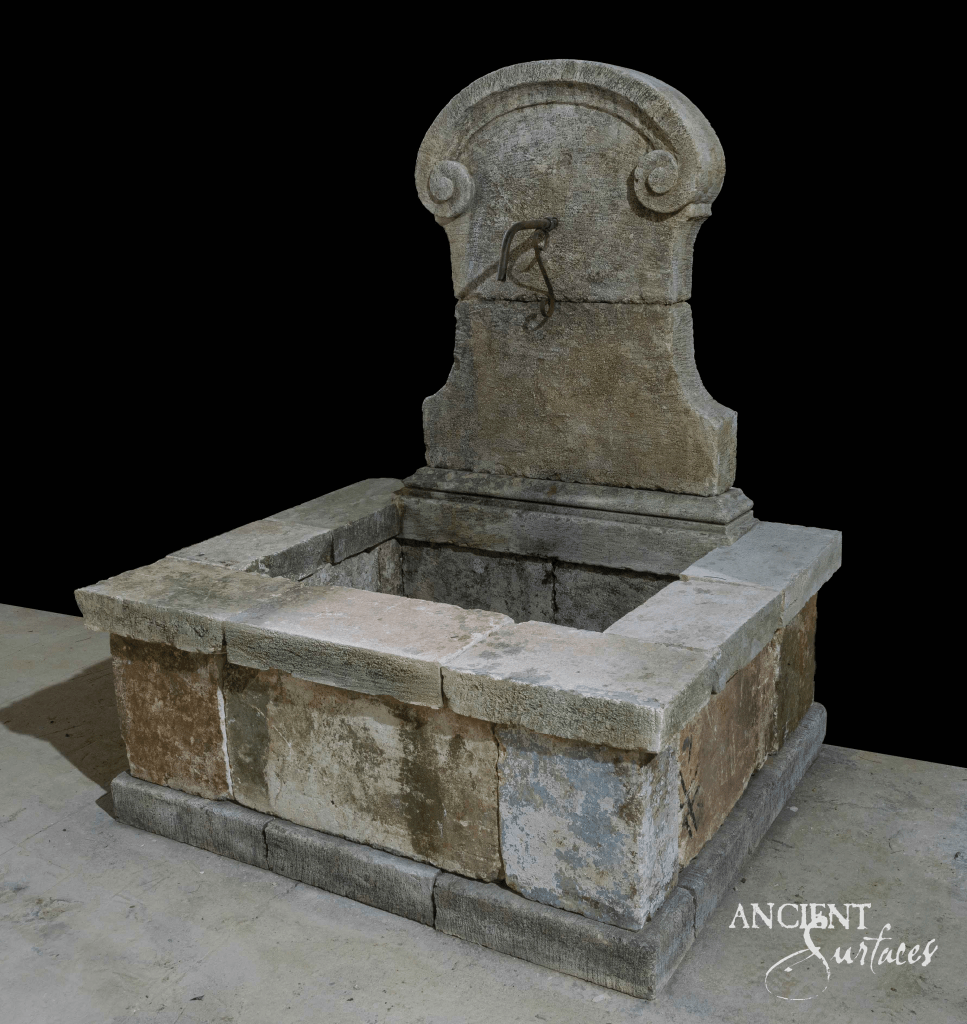
Another fountain captures the eye through its perfect symmetry, framed by carved scrolls and a gently rising pediment. The delicate proportions highlight the stonemason’s artistry, while the weathered limestone surface tells of centuries past. Its visual harmony makes it an ideal centerpiece, where every curve and edge adds a note of refinement to the composition.
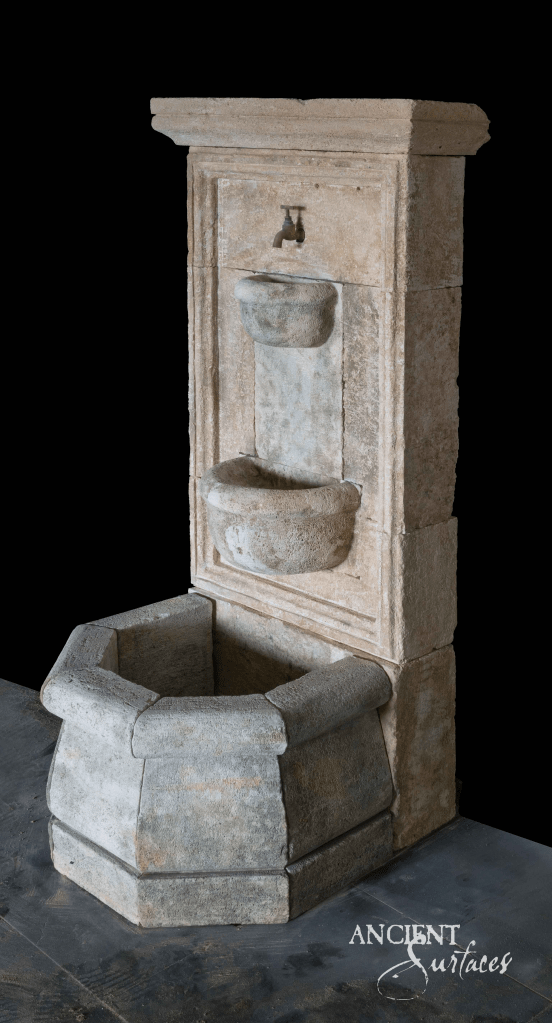
Not all beauty comes from grandeur; sometimes it rests in simplicity. A smaller pedestal wall fountain reveals how restrained design can achieve striking elegance. The scalloped basin, balanced upon a carved column, embodies grace in its most minimal form. It is the kind of understated luxury that makes spaces feel complete without overwhelming them.
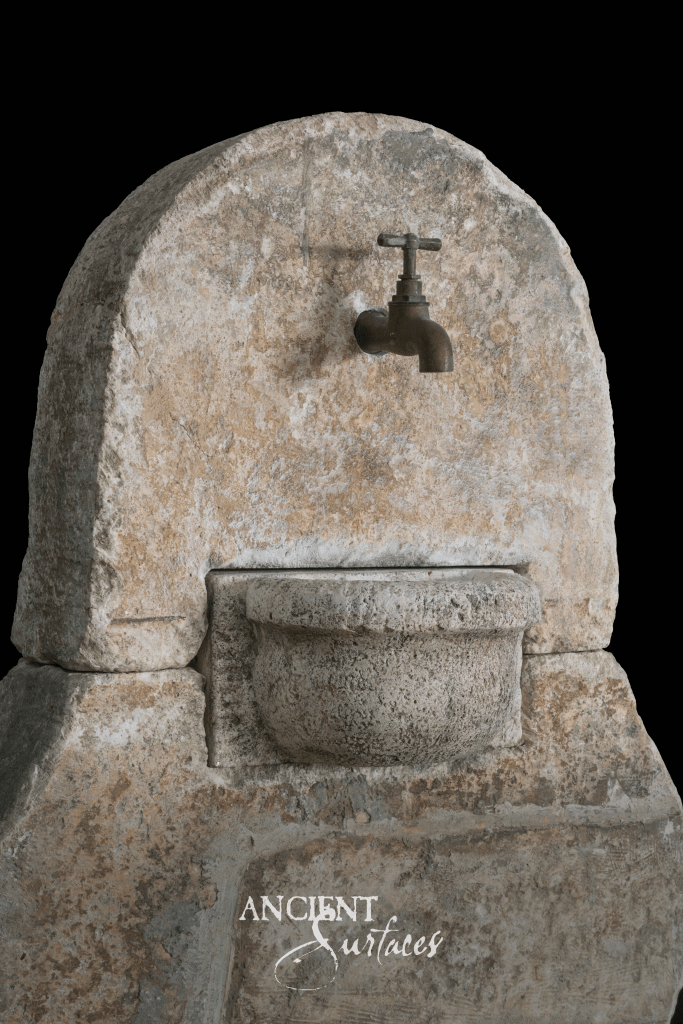
One fountain in the collection reveals just how detailed limestone craftsmanship can be. Its arched recess, carved basin, and subtle moldings highlight the layers of texture embedded in the reclaimed stone. The naturally aged surface deepens the aesthetic, proving that true elegance lies in the way every chisel mark and patina comes together in harmony.
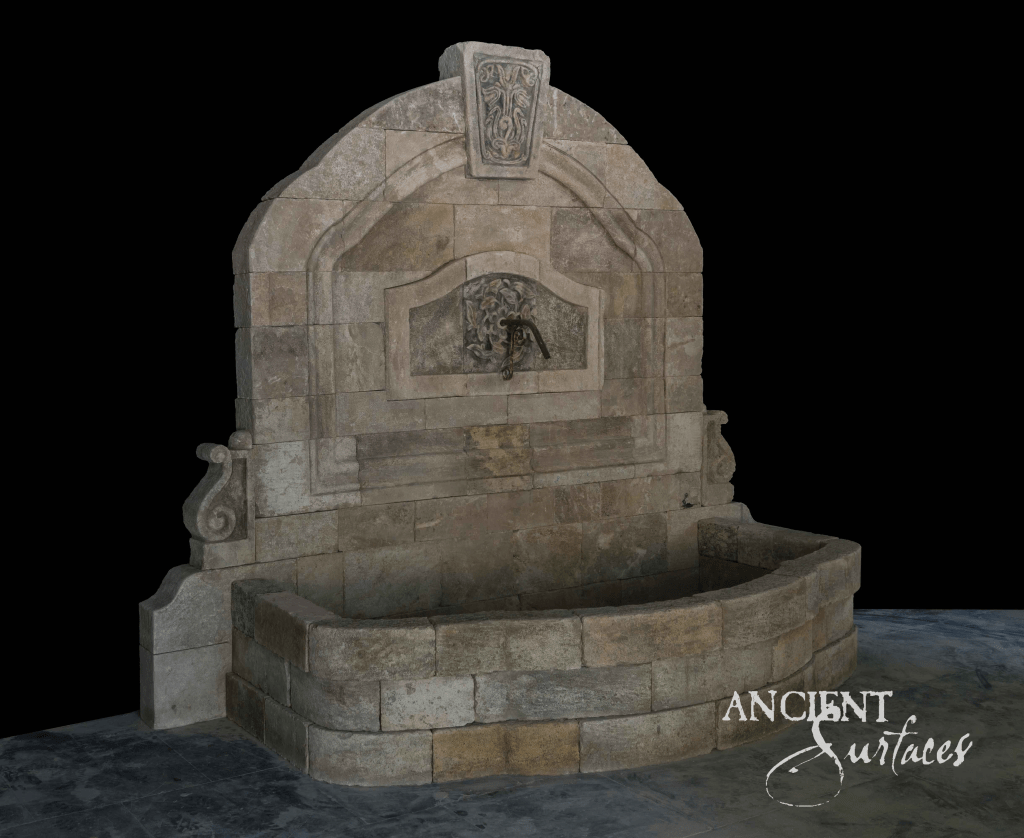
The final fountain in the series is monumental in scale, designed with a stately arched top and decorative carvings. Its lion mask spout is set within a backdrop of detailed stonework, each block carrying the hues and textures of its reclaimed history. This is a fountain that transforms any space into a Mediterranean-inspired retreat, where elegance is defined by both size and detail.
Each antique limestone wall fountain from Ancient Surfaces represents more than just a decorative feature; it is a living fragment of history crafted into art. Whether large or small, ornate or restrained, these fountains are unified by their elegance and attention to detail. By bringing one into your home or garden, you’re not simply installing a water feature, you are investing in a piece of artistry that will elevate your space for generations.
Come visit our interactive digital online catalog
Call us at: 212-461-0245 // 212-913-9588
When it comes to architectural features that breathe history and serenity into a space, few elements rival the charm of antique limestone wall fountains. At Ancient Surfaces, every reclaimed fountain tells a story etched in weathered stone, marked by the passage of centuries, and reborn as a functional work of art. These fountains are more than décor; they are enduring symbols of European craftsmanship and timeless design.

The beauty of these antique wall fountains lies in their hand-carved limestone details. Each piece carries subtle irregularities, patinas, and textures that no modern replica could replicate. From scrolling volutes and floral motifs to bold lion heads, the carvings add sculptural richness while standing as a testament to the artisans who shaped them centuries ago. The stone itself, reclaimed, durable, and authentically aged brings warmth and authenticity to both gardens and interiors.
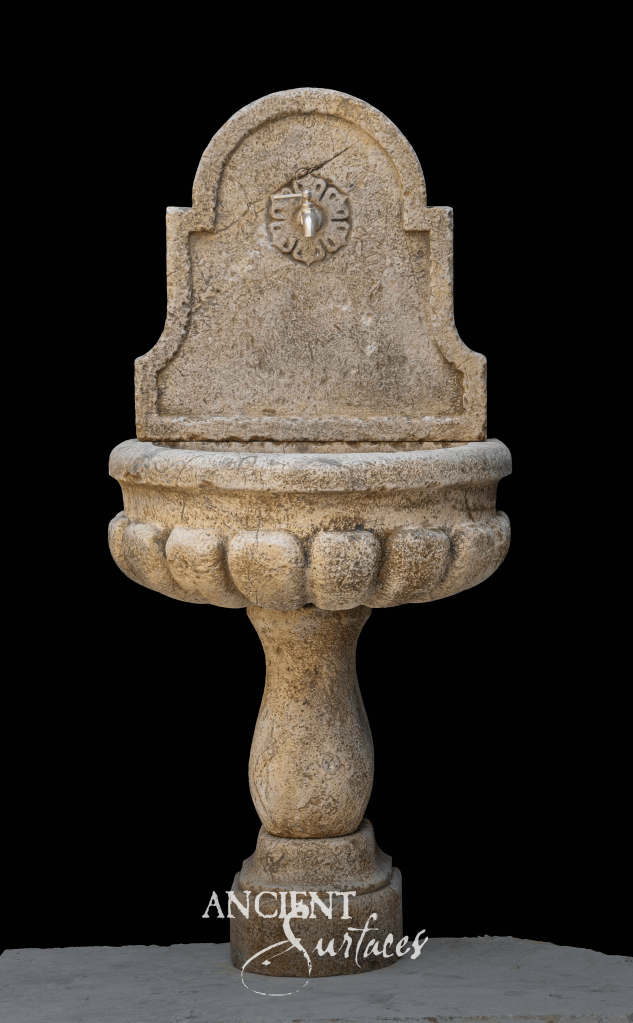
Whether placed in a Mediterranean-inspired courtyard, an entryway, or as a statement in a living room wall niche, these fountains create a soothing acoustic backdrop while elevating the character of their surroundings. Outdoors, they complement reclaimed stone patios, limestone flooring, and lush garden walls. Indoors, they transform transitional spaces into havens of calm, merging architecture with artistry. For example, garden courtyards benefit from the natural sound of flowing water, anchoring the landscape design.

Ancient Surfaces curates a diverse collection of wall fountains, each with its own distinctive character. Some are crafted from geometric blocks of limestone, carefully assembled into structured frames that bring harmony to symmetrical gardens. Others showcase organic, weather-softened carvings, perfectly suited for rustic villas or countryside estates. Many feature bold central spouts shaped as lions, shells, or abstract flourishes that function as both sculpture and water source, adding personality and charm. Every fountain is a singular creation, making each acquisition a rare investment in authenticity.

In today’s world of mass production, authenticity matters. Ancient Surfaces specializes in sourcing and restoring original antique limestone features, ensuring that every fountain carries genuine historic character. Their expertise guarantees that each installation is not only architecturally stunning but also structurally sound, ready to serve generations to come.
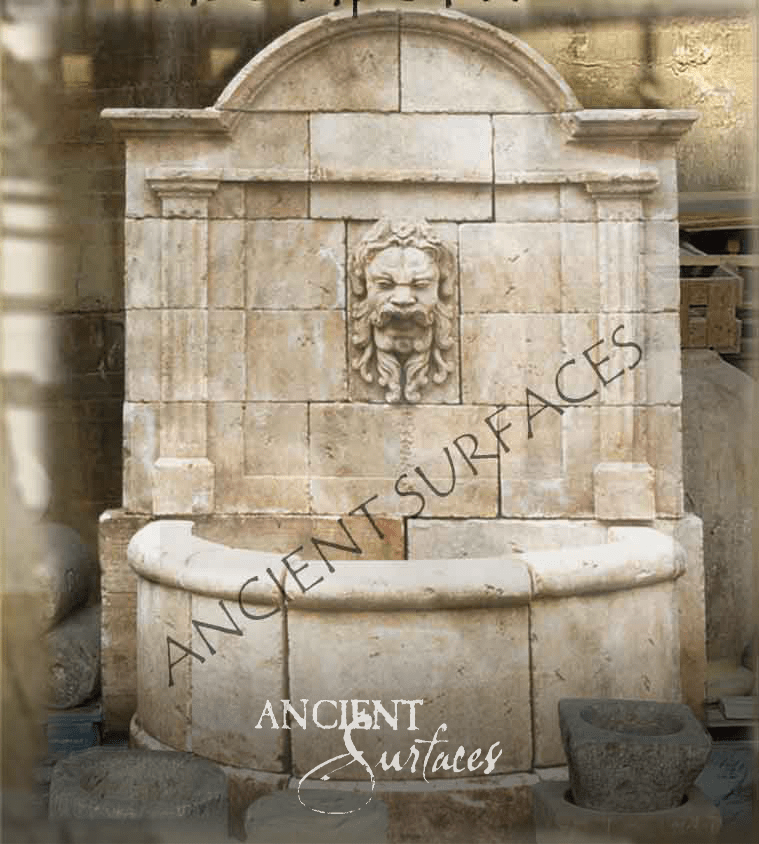
When you choose Ancient Surfaces, you’re not simply buying a fountain you’re welcoming into your home or garden a fragment of history that whispers of old European towns, monasteries, and estates.
If you’ve ever dreamed of owning a fountain that carries both aesthetic power and centuries-old soul, there is no better time to make that vision real.
Come visit our interactive digital online catalog
Call us at: 212-461-0245 // 212-913-9588
In the heart of every enduring garden or sunlit courtyard, a wall fountain becomes more than just a source of water, it becomes a vessel of story. At Ancient Surfaces, each reclaimed limestone fountain is not simply an object of utility, but a preserved fragment of old-world craftsmanship, retold through new settings and lives. These fountains do not whisper; they speak in textured tones, in weathered spouts and silent basins, carrying with them the breath of centuries.
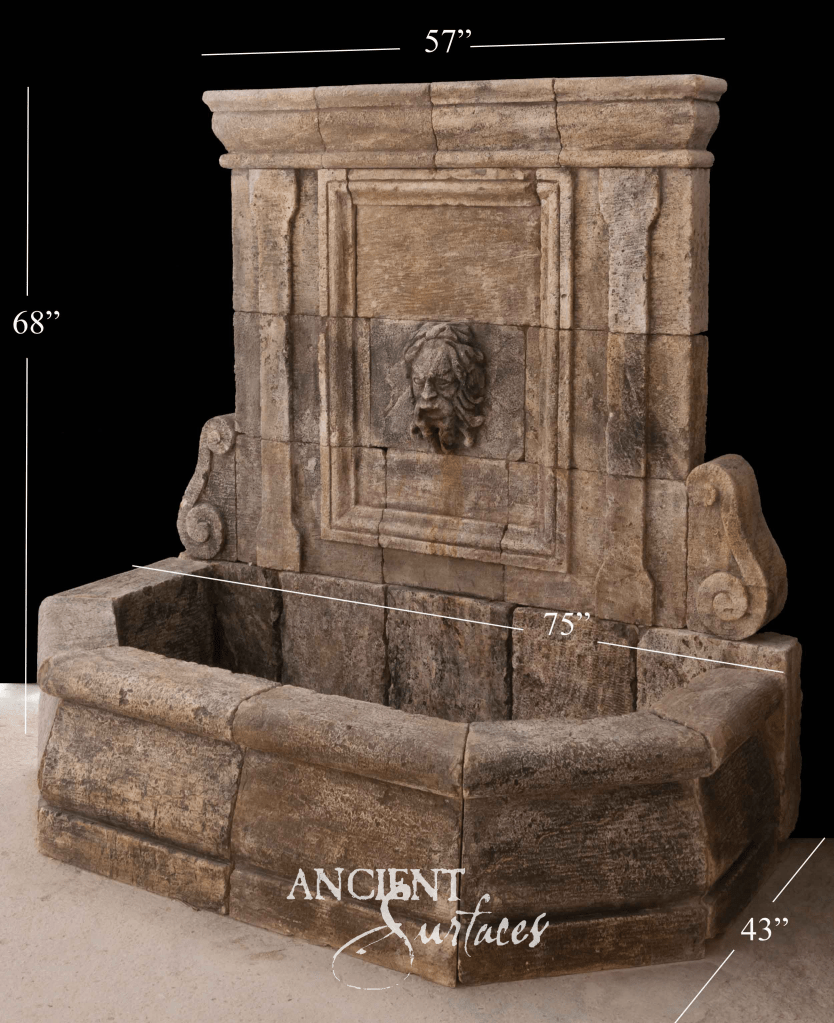
One glance at AWF-128 and you’ll find yourself transported to a bygone hamlet in Southern France. The central rosette, carved in high relief, is surrounded by an abstracted botanical crest a flourish that suggests both elegance and resilience. The aged bronze cup still hanging from its chain reminds us of its original function: a true working fountain meant to serve passersby, animals, and travelers alike. The water might have paused, but the history flows on.
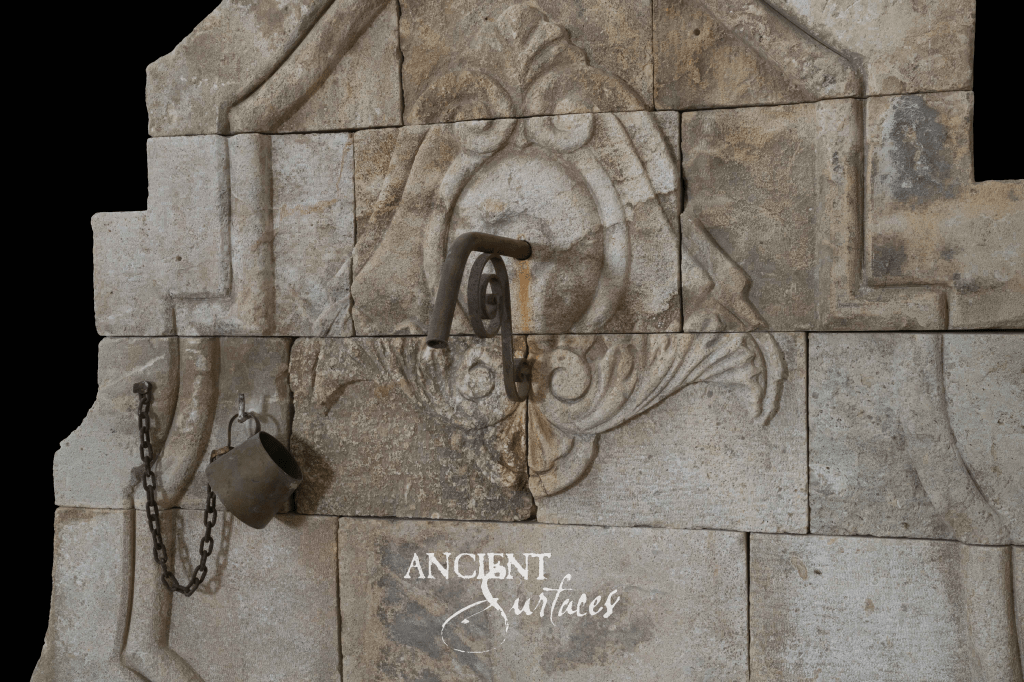
Next to it, AWF-133 exudes classical balance. Its lion-head spout emerges from a tall, gently curved facade adorned with sculptural scrolls and shell motifs, typical of aristocratic courtyards in the late Renaissance. Though the stone is clean and honed, the slight weathering at the base and edges gives away its past life. This is not a new creation made to look old, this is an old creation reborn, as honest and noble as the stone itself.
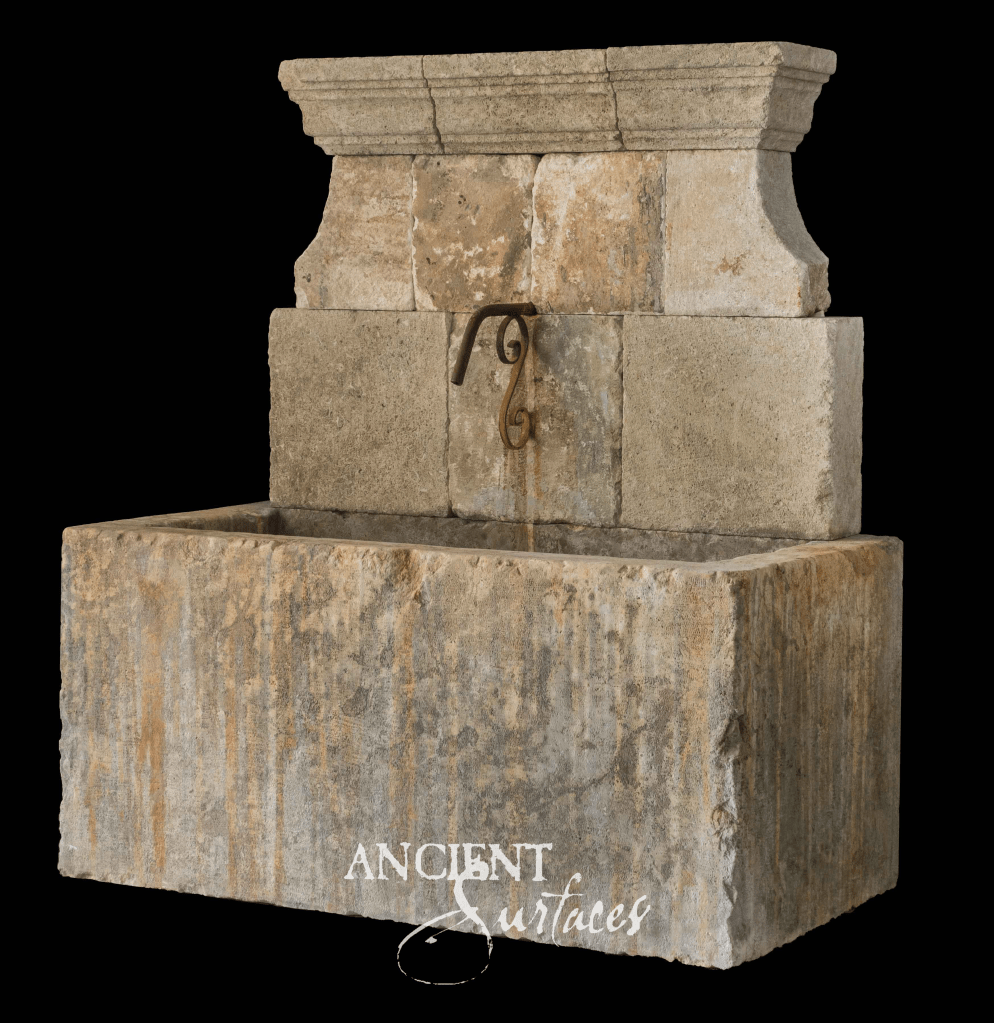
AWF-320 grounds us again in rustic authenticity. With its stout proportions and thick-set basin, this piece feels monastic, built not for show, but for permanence. The iron spout curls with simplicity, and the patina of the stone tells of years under open skies. Its functionality is its poetry: every drip of water down its surface has written its own chapter in silence. Whether placed in a vineyard courtyard or under a pergola, it brings quiet gravitas to its surroundings.

Then there’s the timeless presence of AWF-88, standing tall and noble like a solitary sentinel. Its column form and elevated spout are rooted in Roman design, while the square basin is generous, deep, and inviting. Moss still clings to its corners, remnants of its life nestled beneath olive trees or beside a terracotta farmhouse. This is a fountain that remembers and reveals, offering a tactile link between present beauty and ancient use.

Whether monastic or majestic, baroque or provincial, each wall fountain from Ancient Surfaces offers more than form, it offers function, soul, and story. These are sculpted heirlooms of limestone, collected across time, waiting to flow once more not just with water, but with memory.
Come visit our interactive digital online catalog
Call us at: 212-461-0245 // 212-913-9588
At the heart of every great courtyard lies a conversation between stone and water, silent yet endlessly expressive. In the world of luxury garden design, no one curates that dialogue more elegantly than Ancient Surfaces. Their latest selection of reclaimed wall fountains is more than an offering of sculpted limestone, it’s a revival of lost architecture, brought back to life with artistry and intention.
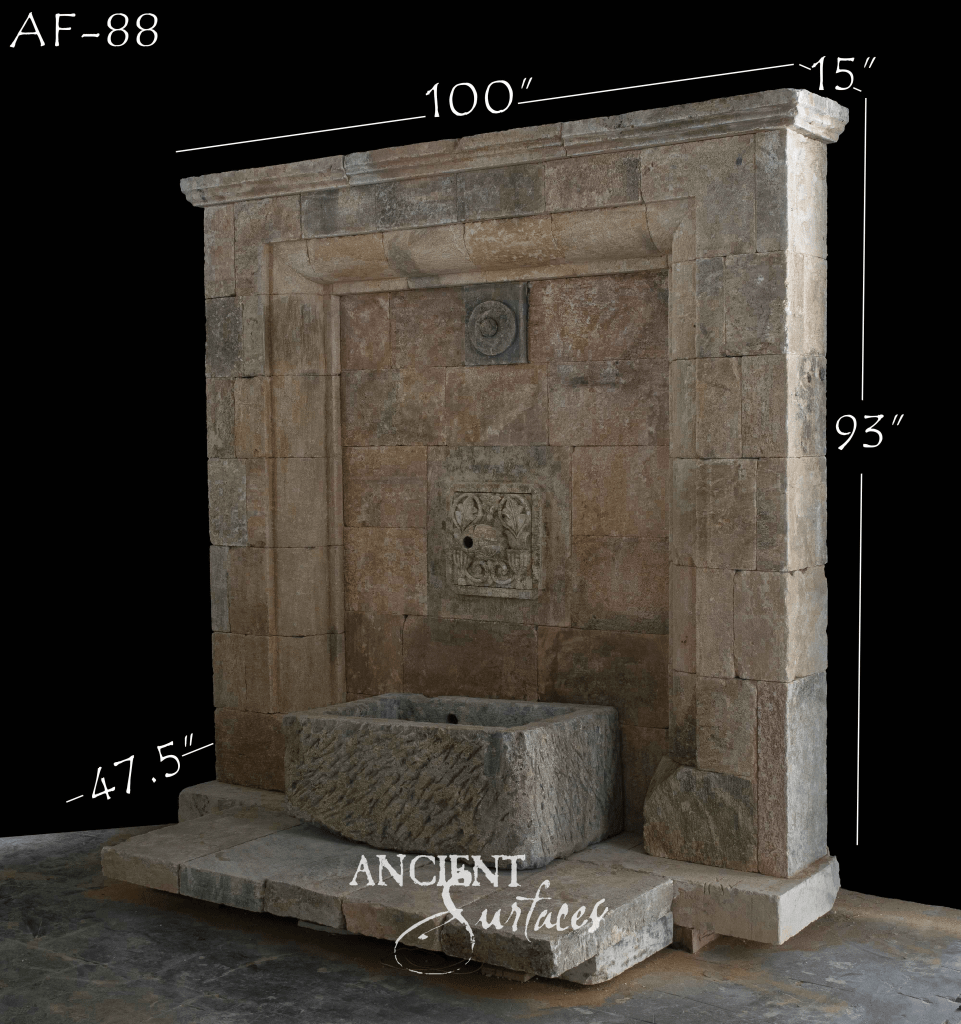
Each fountain in this collection begins with history. Take the commanding presence of AF-88. Towering at 93 inches tall and spanning over 8 feet wide, this monumental piece draws from classical proportions and ecclesiastical carvings. Its sheer scale gives it the presence of a chapel relic, while the weathered stonework marked by time and nature adds quiet reverence. The deeply set trough, chiseled from a single block, invites stillness and reflection.
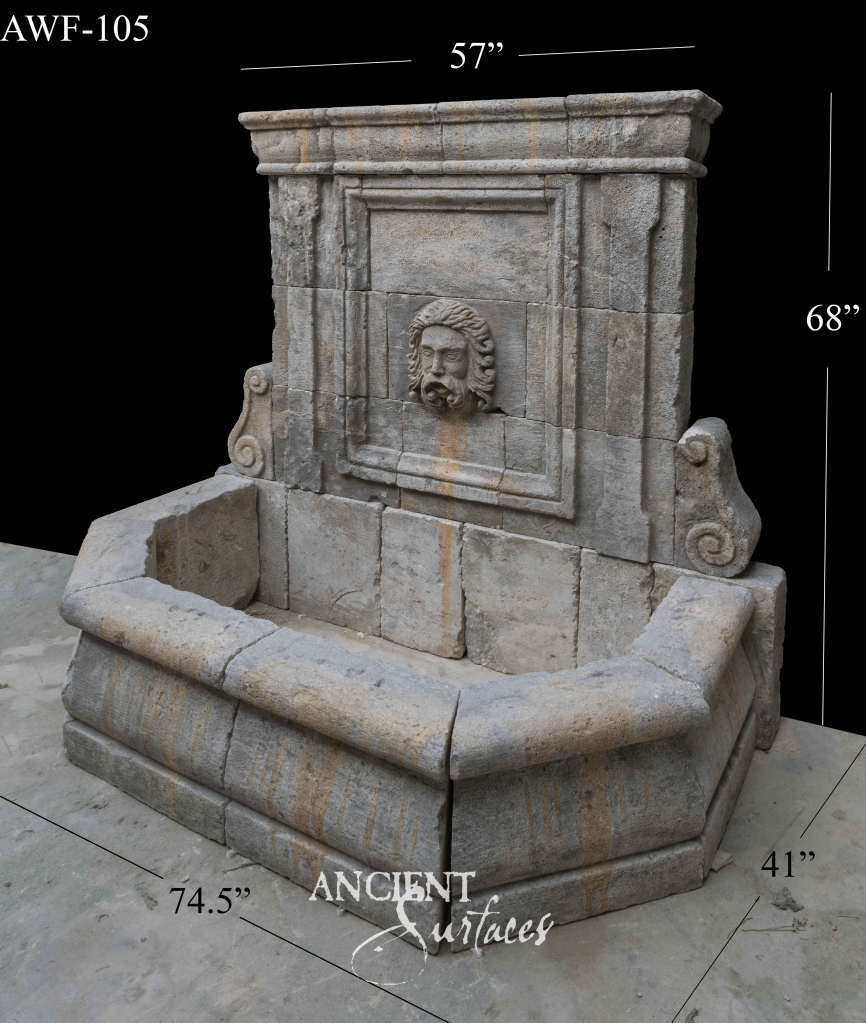
In contrast, AWF-105 offers a more sculptural silhouette with its sweeping scrolls and defined cornice. The water flows from a mythological mask, its expression carved in confident relief into a wide angled basin that beckons the viewer forward. At 74.5 inches wide, it anchors any outdoor space while keeping a sense of sculptural grace, reminiscent of Renaissance villas where such forms once adorned grand facades.
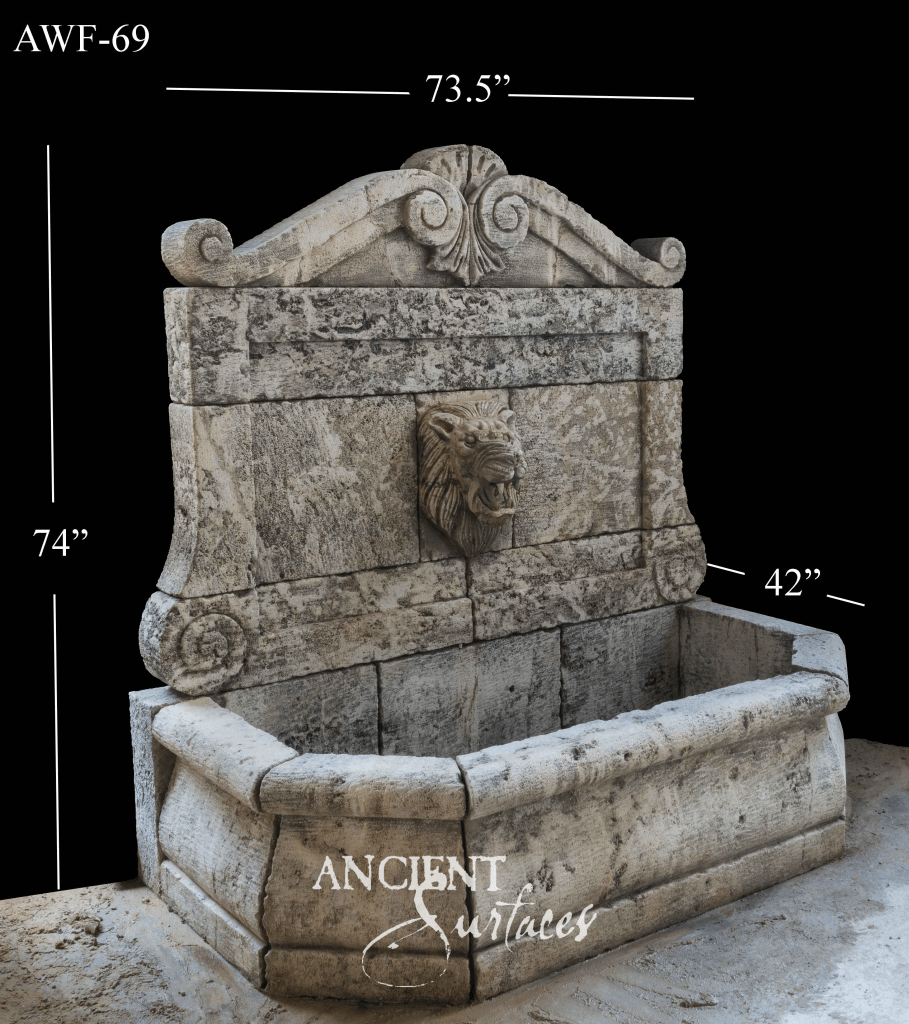
AWF-69, another standout, pairs regal symmetry with an assertive lion’s head spout. Its sharply chiseled contours and curled pediment strike a balance between might and refinement. This piece feels at home in a manor garden, where the echoes of nobility linger in its every crevice. The softened greys of the stone only enhance its architectural charm, aged like the weathered pages of a medieval manuscript.
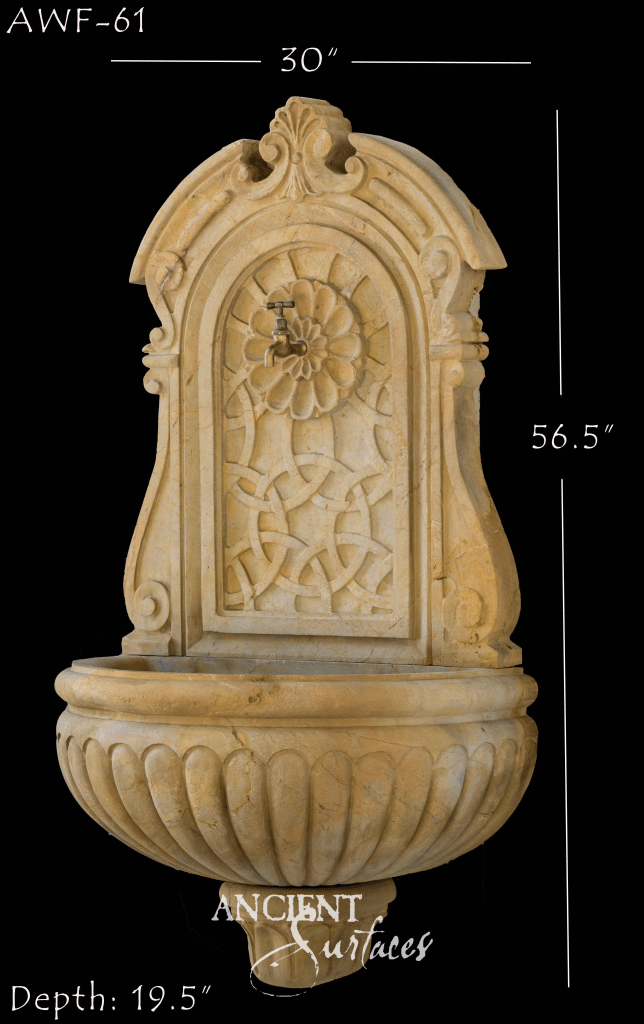
For those seeking subtle romance, AWF-61 is a jewel. With a soft honey-toned patina and delicate floral carving, it’s a whisper rather than a proclamation. Its smaller scale and rounded bowl make it ideal for an intimate courtyard or loggia, where gentle dripping becomes part of the ambiance. Despite its modest footprint, every detail from the arched crown to the petal-like carving speaks of masterful craftsmanship.
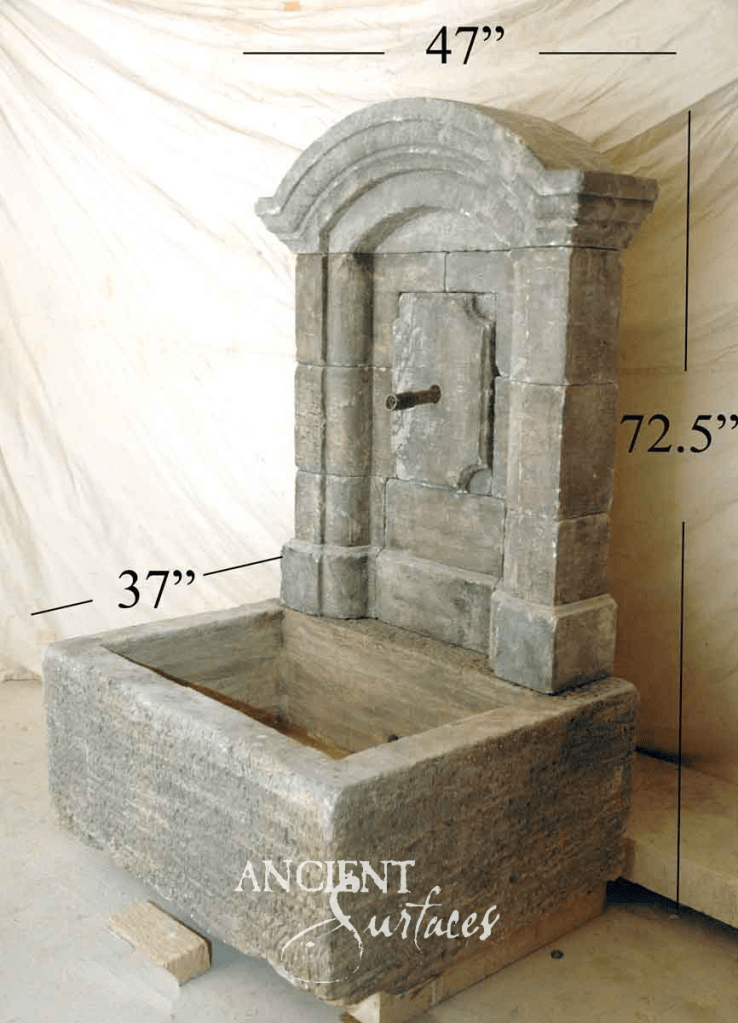
Together, these wall fountains form a curated narrative of reclaimed beauty, each one an heirloom salvaged from the ruins of time. In a world that moves fast and forgets quickly, Ancient Surfaces has chosen to remember, to preserve, and to invite you to live among the relics. These aren’t just fountains. They’re keepers of history designed not only to flow with water, but to flow with meaning.
Come visit our interactive digital online catalog
Call us at: 212-461-0245 // 212-913-9588
There’s a quiet kind of poetry in the way water meets stone. At Ancient Surfaces, we’ve long celebrated this union but it’s in the spout, that elegant curve of metal or stone, where the soul of a wall fountain truly reveals itself. Often overlooked, the spout is where motion, history, and form come to life, turning antique limestone into kinetic sculpture.

In AWF-576-d, the spout juts forward like a musical note held in suspense. Its wrought iron curl, coated in a patina earned by time, speaks to the quiet nobility of French countryside fountains. It feels as though it has always been there weathered but proud completing the blocky basin beneath with a gesture of grace. This spout doesn’t shout, it hums.

The spout of AWF-308-f rests inside a recessed arch framed with volutes and classical scrollwork. Rust trails whisper stories of water that’s flowed for centuries, and the twisted iron spout, perfectly imperfect, invites the viewer into a past life. It’s a fountain for those who crave texture, age, and the kind of design you can feel with your eyes.

Some spouts bloom, others command. AWF-185-d features a stunning floral carving at its center, from which the spout protrudes as if blossoming into function. The floral rosette is more than decoration, it anchors the entire piece, giving the spout a throne from which it reigns. It’s ideal for settings that demand romance without sentimentality.
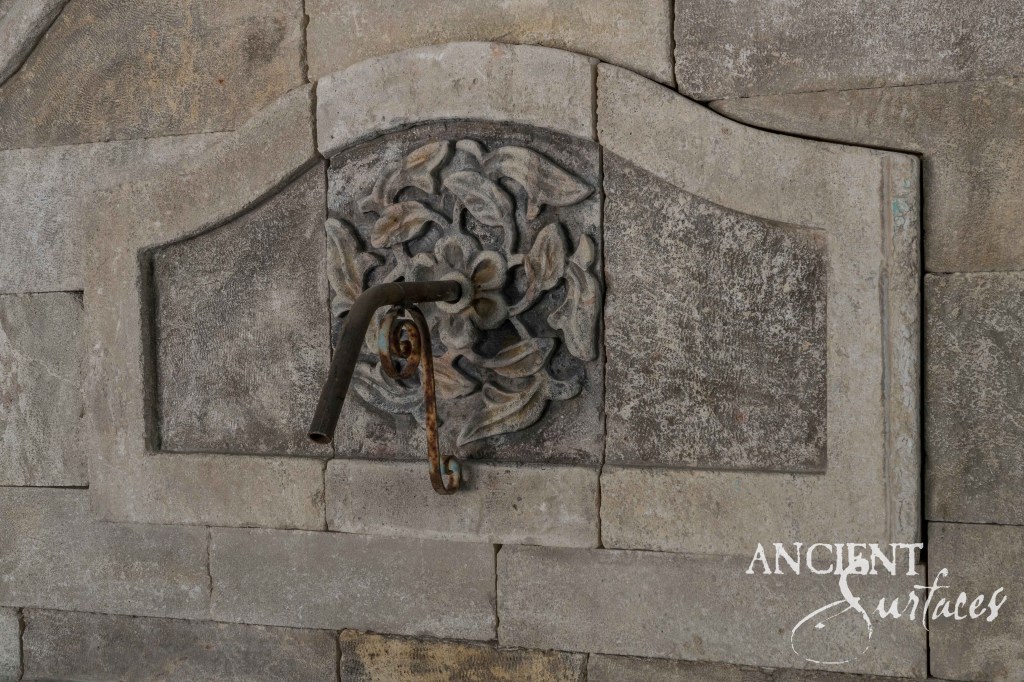
In AWF-200-d, simplicity is everything. The spout rises humbly from a timeworn trough, mounted against a backdrop of gently arched limestone. There’s no flourish, only truth. It’s the kind of piece that belongs in a Provençal vineyard or a sunlit cloister garden, where life flows gently, steadily, quietly.
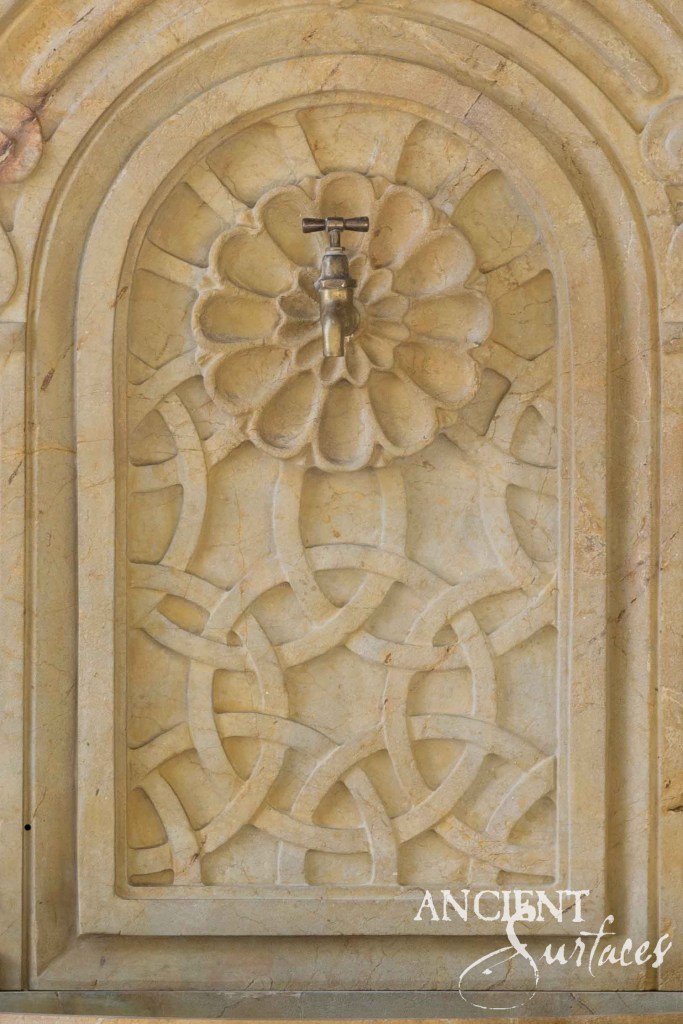
At the center of AWF-61-f sits a brass spigot set against an intricately carved floral medallion. Here, symmetry and richness collide, the Celtic-like interlacing around it speaks to timeless craftsmanship, while the polished brass spout adds a glimmer of modern nobility. It’s a fountain for connoisseurs of balance.
Each wall fountain by Ancient Surfaces isn’t just reclaimed limestone, it’s a sculptural narrative. And the spouts, whether coiled or commanding, floral or forged, provide the essential punctuation. They are the bridge between history and function, between design and story.
Come visit our interactive digital online catalog
Call us at: 212-461-0245 // 212-913-9588
In the world of landscape design, few elements possess the quiet authority and enduring grace of a wall fountain crafted from reclaimed limestone. Each wall-mounted basin by Ancient Surfaces is more than a decorative element, it is a vessel of history, hand-carved in a time when stonework was storytelling. These fountains not only offer the serenity of flowing water but also ground your home in centuries of craftsmanship and natural beauty. Below, we explore six unique wall fountains that showcase the rare artistry behind every reclaimed piece.
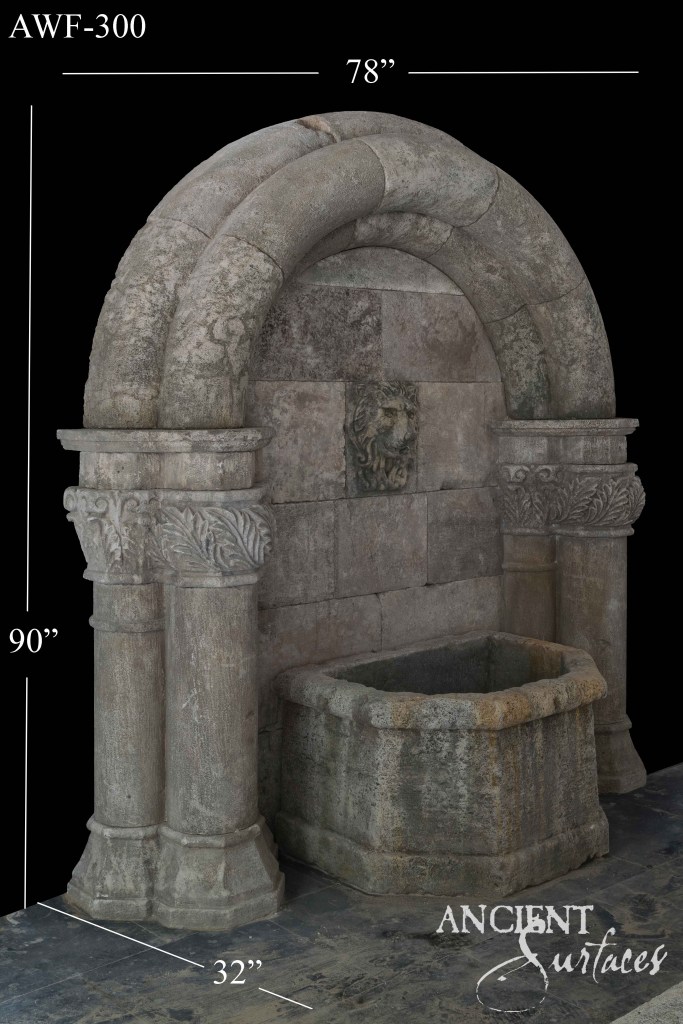
A commanding arch of reclaimed limestone embraces the lion-headed spout of the AWF-300. With its 90-inch height and hand-chiseled pillars, this fountain is a tribute to Romanesque architectural heritage. The patina of time is etched into every surface, and the lion motif injects regal energy into the courtyard. Its scale alone commands presence, but it’s the textures, worn, fluted, and moss-kissed that breathe life into your walls.
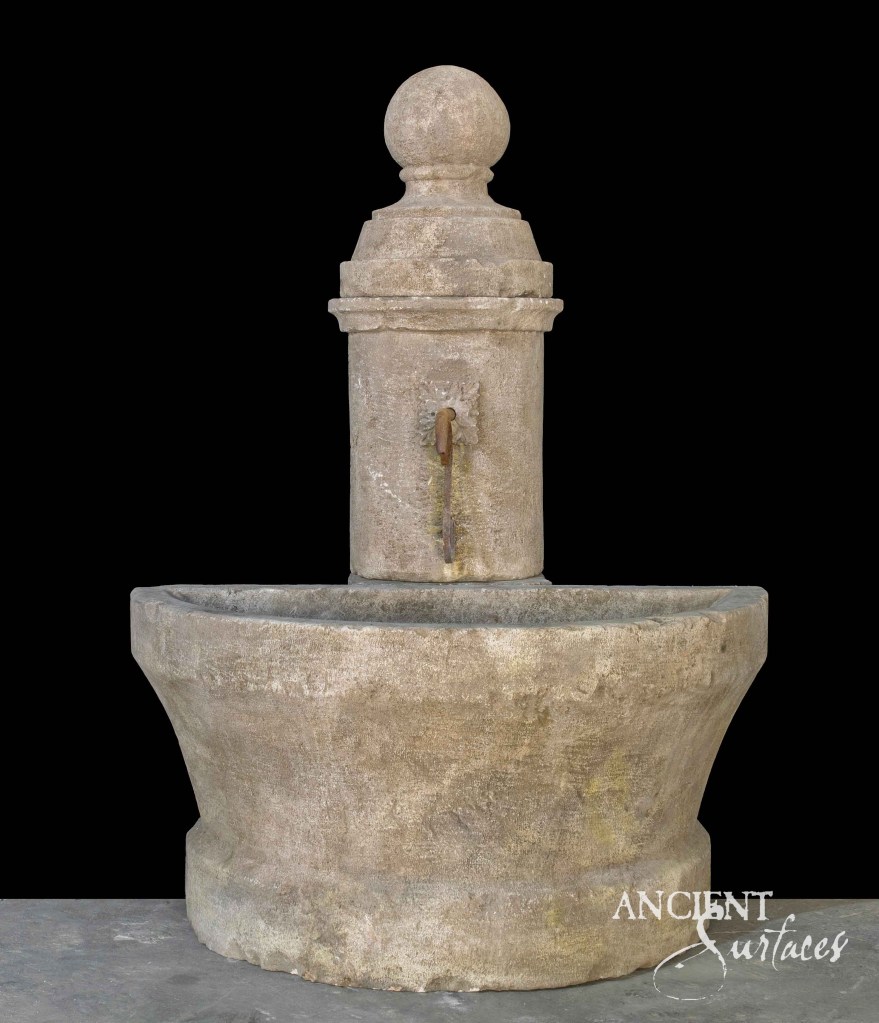
Minimalist yet monumental, the AWF-566 features a perfectly flared basin supporting a stout tower capped with a round finial. This wall fountain has the feel of a Mediterranean village square, where locals once gathered to fill urns and exchange stories. The reclaimed limestone bears traces of its original environment, a tactile reminder that beauty often lies in age and imperfection.
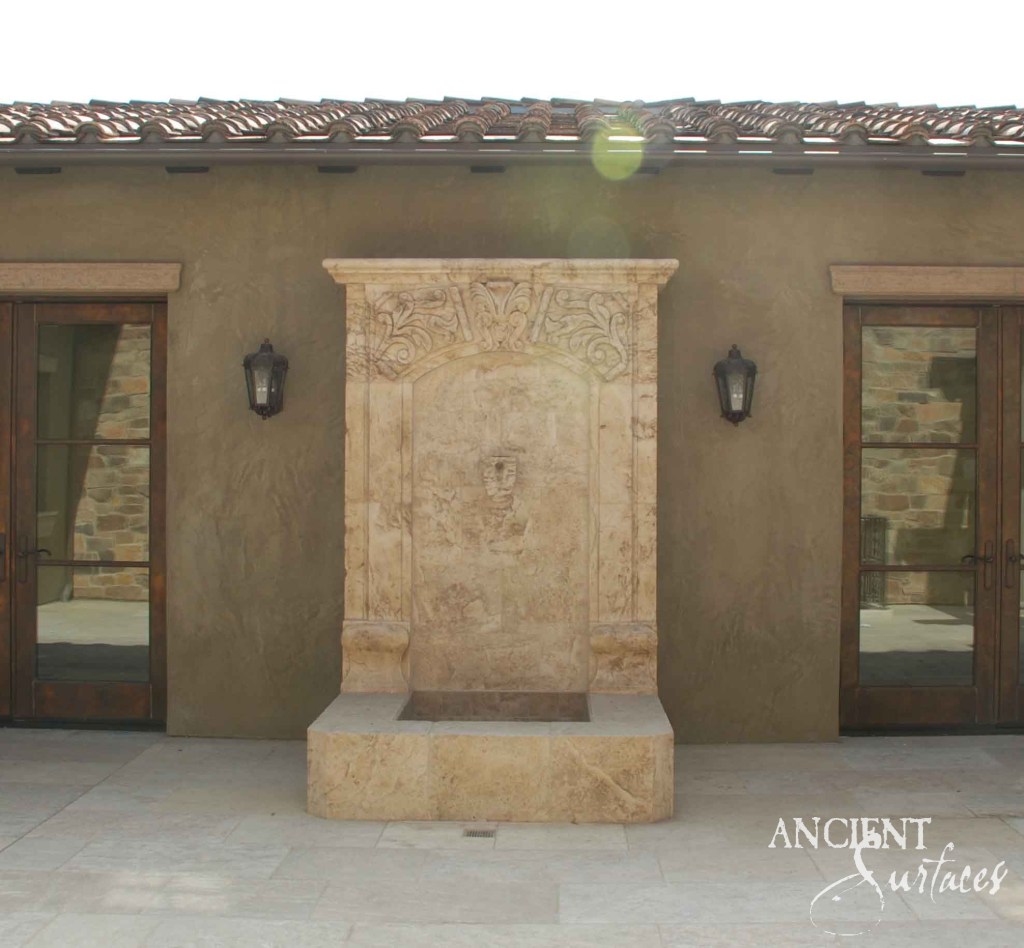
Blending seamlessly into the surrounding stucco and terracotta, this installed wall fountain is a perfect example of how Ancient Surfaces integrates historical stone into modern settings. The delicate carvings on the arch crown above a noble face, subtly evoking heraldic grandeur. This reclaimed limestone feature creates a natural focal point, turning a blank wall into a narrative surface.
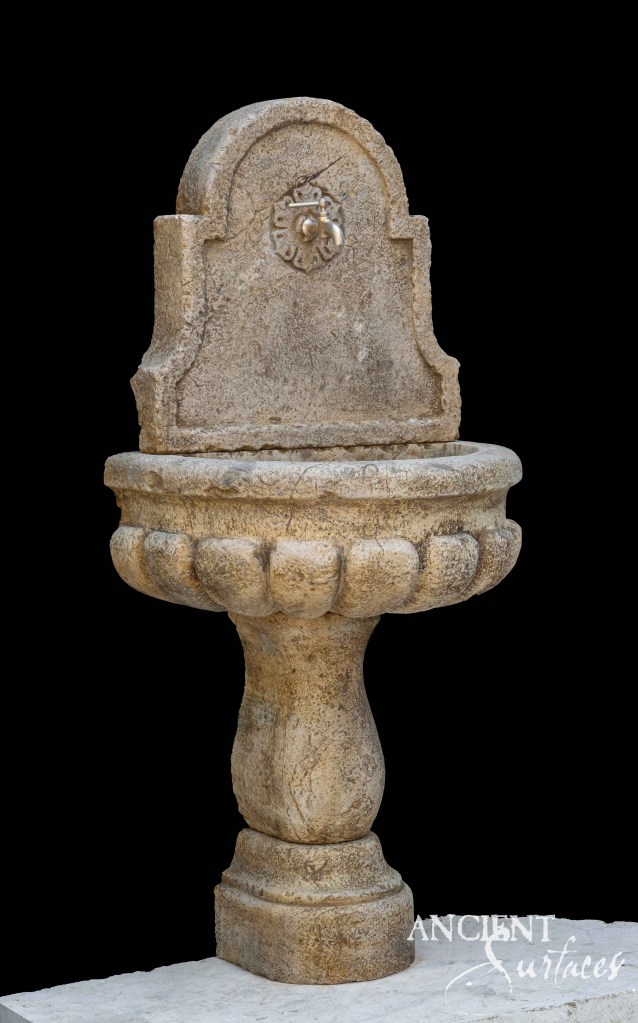
This wall-mounted basin stands apart with its baroque curves and pedestal base, making it ideal for more romantic or classical gardens. The scalloped rim and rounded proportions echo the carved bowls found in European cloisters. Hand-hewn from antique limestone, the AWF-583 carries a soft golden hue that deepens in shadow, catching light and memory in equal measure.
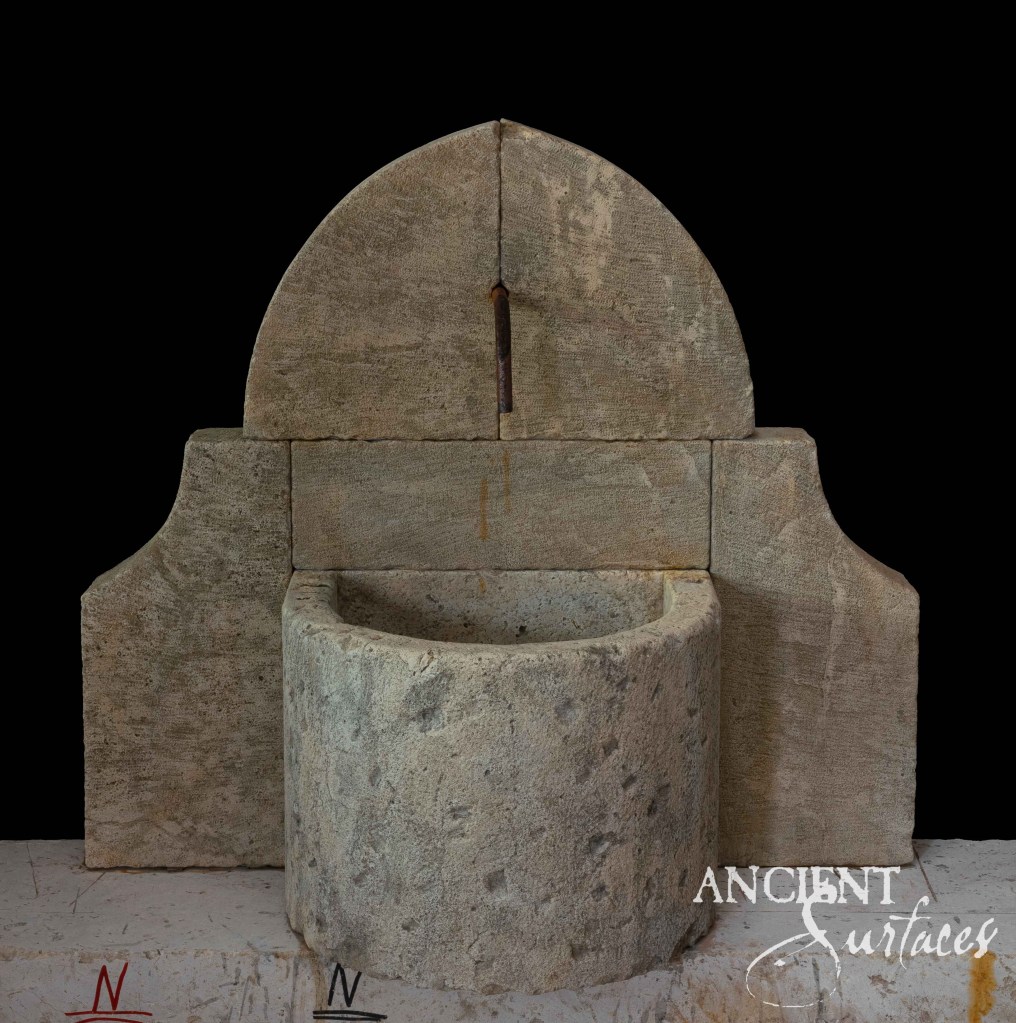
Pure and elemental, the AWF-599 evokes the earliest wall fountains of rural stone monasteries. Its semicircular basin, supported by a thick, grounded wall back, invites touch. The reclaimed limestone surface, dotted with fossil inclusions and subtle veining, tells a geological story as compelling as any family heirloom. Water spilling from this basin feels monastic, sacred in its simplicity.
At Ancient Surfaces, every pool fountain is not just reclaimed, it’s reborn. Let your garden speak the language of water. Let it whisper in limestone.
Come visit our interactive digital online catalog
Call us at: 212-461-0245 // 212-913-9588


